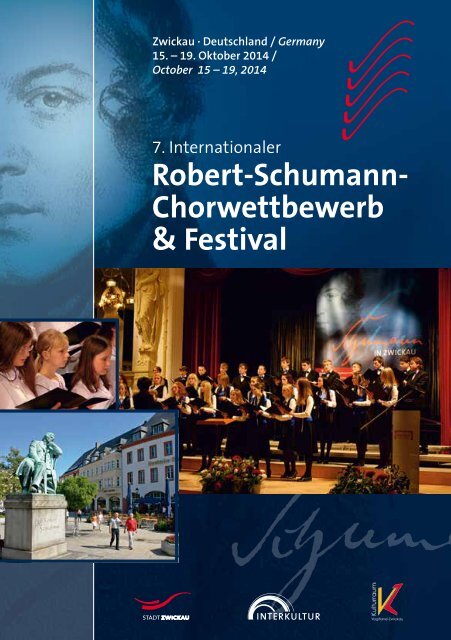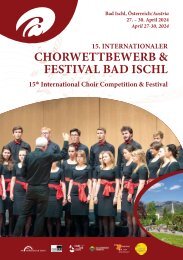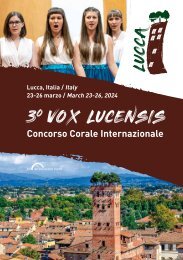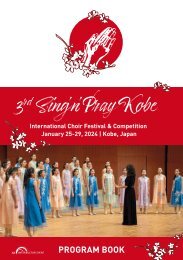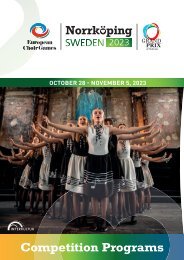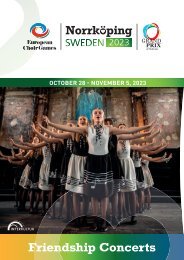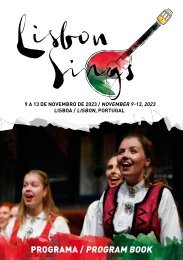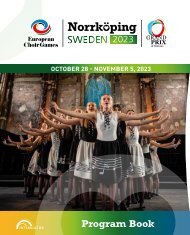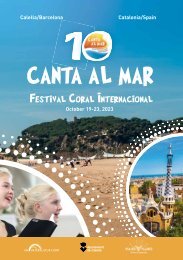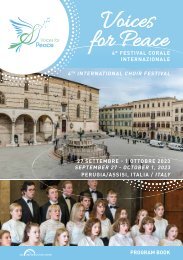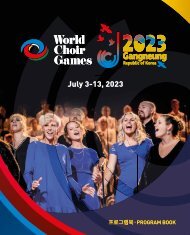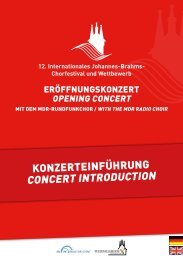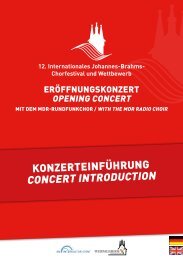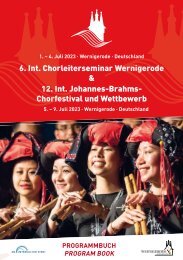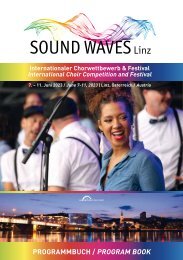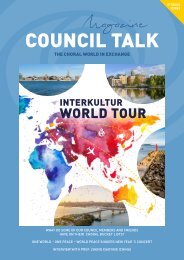7th International Robert Schumann Choir Competition & Festival Zwickau - Program Book
Zwickau, the birthplace of the composer Robert Schumann, is host of the correspondent choir competition. The event focuses on the compositional works of Robert Schumann and his contemporaries. One of the main intentions of this festival is the new interpretation as well as the cultivation of the 19th century works. Another point of emphasis is the international choir music; mainly the variety of modern choir singing in association with international understanding shall be demonstrated. An advisory circle, together with internationally recognised experts in the field of choral music, will be responding to the often expressed desire of many choirs for comprehensive pedagogical and artistic advice, and also coming to terms with the inhibitions associated with "competitions". Friendship Concerts in Zwickau and the vicinity will provide outstanding possibilities for experiencing the complete fascination of this renowned international choral festival.
Zwickau, the birthplace of the composer Robert Schumann, is host of the correspondent choir competition. The event focuses on the compositional works of Robert Schumann and his contemporaries. One of the main intentions of this festival is the new interpretation as well as the cultivation of the 19th century works. Another point of emphasis is the international choir music; mainly the variety of modern choir singing in association with international understanding shall be demonstrated.
An advisory circle, together with internationally recognised experts in the field of choral music, will be responding to the often expressed desire of many choirs for comprehensive pedagogical and artistic advice, and also coming to terms with the inhibitions associated with "competitions". Friendship Concerts in Zwickau and the vicinity will provide outstanding possibilities for experiencing the complete fascination of this renowned international choral festival.
Create successful ePaper yourself
Turn your PDF publications into a flip-book with our unique Google optimized e-Paper software.
<strong>Zwickau</strong> · Deutschland / Germany<br />
15. – 19. Oktober 2014 /<br />
October 15 – 19, 2014<br />
7. <strong>International</strong>er<br />
<strong>Robert</strong>-<strong>Schumann</strong>-<br />
Chorwettbewerb<br />
& <strong>Festival</strong>
2<br />
Überschrift / Überschirft<br />
Undi nosae pro tetur sunt por sit, nimiliquam<br />
quam utaquunt etur simod mi, eat<br />
officip saperiaero quia veratiam ut veniene<br />
cullaut qui cuptiist exeritis eatur restiasperi<br />
non cum voluptur aut unt volorpore<br />
molore, con nonsectus necab iust quidestias<br />
magnisc iasperiae escipicto quamet et<br />
est, con possimi, odis autemol esequuntio.<br />
Empeliscias debitam dolor aut moditatis<br />
magnihicte vit vendictio. Et am quibus, qui<br />
volupturent venis sunt haria dolupta verspis<br />
aut vel ipsandus, im facest ene conserspidit<br />
essimai onsequis ipsuntintiis venisto coreper<br />
uptaque ea qui unt.<br />
Il et que volenistis dio minctur arum quisque<br />
volorpore voleni aut ipid et doloressi vendae.<br />
Aximaximus, qui conem. Pidelis qui volupti<br />
doluptasit vent lab in re rerferum rehent.<br />
Ligent, nosa diandus doluptati adi aut fugit<br />
quam nulpa dit ut et venist, od quo blaut estiisque<br />
pliat dolestrum ni inimus eseditatus<br />
dolupti aut doluptat veritium que odit aut<br />
qui to qui cum, quatur acepedi gnimus numende<br />
si aut explibus, voloratam<br />
atur autest, quatemquiati quam quiducit accaessi<br />
coritium quam fuga. Rias dolectem voluptat<br />
im ime pratis este sequiant lam sim hiciate<br />
nis est, tecabor enihicti occum labor aut<br />
eate officid elentestis aut laborrum iunture<br />
iumque ea volutatincia coresci tiberov itincti<br />
cus as quid es autatiistis aut et, quatur sumenis<br />
eos dolorep edignimus diam quas aut accus<br />
volut est alic tes rest utatem vellam, qui<br />
debis magnam natia volupta ecabo. Dae eos<br />
atumquiam, illatiis exceatet eum, odi tore,<br />
apitis expe dit as aut latenihit dolupta quia<br />
sumquae es num que nis sundero vero beri<br />
quo volore simodic imagnatius alit dolessu<br />
menissi qui resto voluptas volescidusa nihicie<br />
ndandun destor sitiisi ntiasi quid qui debitat<br />
optatur modit vent.<br />
Idit odis dolorro con consequ aeribusam quidelique<br />
nessendit lab ime plitae maximus<br />
dandit eaquia consequat.<br />
Olorem ium aboreicid que volore nobis doloritesto<br />
idelia dio eatur, volorecto ipsam<br />
Photo Credits: 1 © Studi43 | 2 © INTERKULTUR | 3 © Kevin Husted
3<br />
7. <strong>International</strong>er<br />
<strong>Robert</strong>-<strong>Schumann</strong>-Chorwettbewerb<br />
& <strong>Festival</strong> <strong>Zwickau</strong><br />
7 th <strong>International</strong> <strong>Robert</strong> <strong>Schumann</strong><br />
<strong>Choir</strong> <strong>Competition</strong> & <strong>Festival</strong> <strong>Zwickau</strong><br />
15. – 19. Oktober 2014, <strong>Zwickau</strong>, Deutschland<br />
October 15 – 19, 2014, <strong>Zwickau</strong>, Germany<br />
Eine INTERKULTUR Veranstaltung / An INTERKULTUR event<br />
Veranstalter / Organizer<br />
Förderverein Interkultur e. V.<br />
unterstützt von / Supported by<br />
Stadt <strong>Zwickau</strong> / City of <strong>Zwickau</strong><br />
„Kultur Z.“ GmbH<br />
gefördert durch / Sponsored by<br />
Kulturraum Vogtland – <strong>Zwickau</strong><br />
In Zusammenarbeit mit / In cooperation with<br />
<strong>Robert</strong>-<strong>Schumann</strong>-Haus <strong>Zwickau</strong><br />
<strong>Robert</strong>-<strong>Schumann</strong>-Konservatorium <strong>Zwickau</strong><br />
Westsächsischer Chorverband e. V.<br />
Schirmherrschaft / Patronage<br />
Dr. Pia Findeiß<br />
Oberbürgermeisterin der Stadt <strong>Zwickau</strong> / Lord Mayor of <strong>Zwickau</strong><br />
Präsident INTERKULTUR / President INTERKULTUR<br />
Günter Titsch<br />
Künstlerisches Komitee / Artistic Committee<br />
Prof. Dr. Ralf Eisenbeiß (Deutschland / Germany)<br />
Nico Nebe (Deutschland / Germany)<br />
INTERKULTUR Board<br />
Günter Titsch (Deutschland / Germany)<br />
Wang Qin (China)<br />
Stefan Bohländer (Deutschland / Germany)<br />
Prof. Dr. Ralf Eisenbeiß (Deutschland / Germany)
5<br />
Inhalt / Table of contents<br />
Seite / Page<br />
Veranstalter / Organizer 3<br />
Inhaltsverzeichnis / Table of content 5<br />
Teilnehmende Nationen / Participating countries 4<br />
Danksagung / Acknowledgement<br />
Grußworte / Greetings 8<br />
• Günter Titsch, Präsident / President INTERKULTUR<br />
• Dr. Pia Findeiß, Oberbürgermeisterin der Stadt <strong>Zwickau</strong> / Lord Mayor of <strong>Zwickau</strong><br />
Über INTERKULTUR / About INTERKULTUR 14<br />
• Text “Brücken der Begegnung” / “Connecting Bridges“<br />
• Statistik / Statistics<br />
• Preisträger der bisherigen Wettbewerbe / Prize Winners of the Previous <strong>Competition</strong>s<br />
• Gewinner des <strong>Robert</strong>-<strong>Schumann</strong>-Chorpreises 2010 /<br />
<strong>Robert</strong> <strong>Schumann</strong> <strong>Choir</strong> Prize Winner 2010<br />
Über <strong>Zwickau</strong> / About <strong>Zwickau</strong> 26<br />
• Die Gastgeberstadt <strong>Zwickau</strong> / The Host City <strong>Zwickau</strong><br />
• <strong>Robert</strong> <strong>Schumann</strong> und das Chorleben in <strong>Zwickau</strong> /<br />
<strong>Robert</strong> <strong>Schumann</strong> and the <strong>Choir</strong> Community in <strong>Zwickau</strong><br />
Künstlerisches Komitee und Jury / Artistic Committee and Jury 36<br />
• Ralf Eisenbeiß (Deutschland / Germany)<br />
• Nico Nebe (Deutschland / Germany)<br />
• Branko Stark (Kroatien / Croatia)<br />
• Henri Pompidor (Frankreich / France)<br />
Allgemeiner Ablauf / General Schedule 42<br />
Eröffnungskonzert, Abschlussveranstaltung & Preisverleihung /<br />
Opening Concert, Closing & Award Ceremony 48<br />
Wettbewerb / <strong>Competition</strong> 54<br />
• Veranstaltungsorte / Venues<br />
• Wettbewerb / <strong>Competition</strong><br />
„Beim Abschied zu singen“ 64<br />
Chöre / <strong>Choir</strong>s 72<br />
Impressum & Team / Imprint & Team 82<br />
Stadtplan / Downtown Map 83
6<br />
Teilnehmende Nationen / Participating countries<br />
Deutschland /<br />
Germany<br />
Norwegen /<br />
Norway<br />
Frankreich /<br />
France<br />
Russland /<br />
Russia<br />
Iran /<br />
Iran<br />
Schweiz /<br />
Switzerland<br />
Kroatien /<br />
Croatia<br />
Tschechische Republik /<br />
Czech Republic<br />
Lettland /<br />
Latvia<br />
Weißrussland /<br />
Belarus<br />
Danksagung / Acknowledgement<br />
Die Veranstalter danken dem Kulturraum Vogtland-<strong>Zwickau</strong> und der Stadt <strong>Zwickau</strong>, die<br />
mit ihrer finanziellen Unterstützung die Durchführung des 7. <strong>International</strong>en <strong>Robert</strong>-<br />
<strong>Schumann</strong>-Chorwettbewerbs vom 15. – 19. Oktober 2014 in <strong>Zwickau</strong> ermöglicht haben.<br />
The organizers would like to thank the Kulturraum Vogtland-<strong>Zwickau</strong> and the city of <strong>Zwickau</strong><br />
for its contribution and financial support of the 7 th <strong>Robert</strong> <strong>Schumann</strong> <strong>Choir</strong> <strong>Competition</strong>,<br />
15 th to 19 th October 2014, <strong>Zwickau</strong>.
7<br />
Photocredits: top: © Kevin Husted (left), 2 © Beverlym Milam (right), below: © City of Sochi
9<br />
GRUSSWORTE<br />
GREETINGS
10<br />
Günter Titsch<br />
Präsident INTERKULTUR /<br />
President INTERKULTUR<br />
Liebe <strong>Schumann</strong>freunde, liebe Freunde<br />
der Chormusik,<br />
im Namen von INTERKULTUR begrüße ich<br />
Sie sehr herzlich zum 7. <strong>International</strong>en<br />
<strong>Robert</strong>-<strong>Schumann</strong>-Chorwettbewerb & <strong>Festival</strong><br />
2014. Wir freuen uns, dass wir Sie in<br />
<strong>Zwickau</strong>, der <strong>Robert</strong>-<strong>Schumann</strong>-Stadt, begrüßen<br />
können.<br />
Unsere diesjährige Veranstaltung, die<br />
siebente seit der Gründung des Wettbewerbs<br />
1992, wird wiederum maßgeblich<br />
durch die Unterstützung unserer Partner<br />
vor Ort ermöglicht. Mein besonderer Dank<br />
gilt der Stadt <strong>Zwickau</strong> und “Kultour Z.” für<br />
die freundliche Unterstützung. Bedanken<br />
möchte ich mich ganz besonders beim “Kulturraum<br />
Vogtland-<strong>Zwickau</strong>” für die Förderung<br />
unseres Wettbewerbs, ohne den diese<br />
Veranstaltung nicht möglich gewesen wäre.<br />
„Ehre das Alte hoch, bringe aber auch dem<br />
Neuen ein warmes Herz entgegen“ – Dieser<br />
Leitsatz aus den musikalischen Haus- und<br />
Lebensregeln von <strong>Robert</strong> <strong>Schumann</strong> ist<br />
nicht nur ein Handlungsfaden dieses Wettbewerbs.<br />
Er durchzieht unsere Veranstaltungen,<br />
die wir überall auf der Welt durchführen,<br />
in einer grundsätzlichen Art und<br />
Weise. Und darüber hinaus ist es eines der<br />
Leitziele von INTERKULTUR über die Musik<br />
aus Gegenwart und Vergangenheit Brücken<br />
der Verständigung zwischen den Völkern zu<br />
bauen. Das ist ein Ziel, welches in der heutigen<br />
weltpolitischen Situation, in der zahlreiche<br />
Konflikte auch in Europa zu eskalieren<br />
drohen, nicht hoch genug zu würdigen ist.<br />
INTERKULTUR hat in den 26 Jahren des Bestehens<br />
in weit mehr als 150 internationalen<br />
Veranstaltungen diese Brückenfunktion<br />
des Chorgesangs unter Beweis gestellt.<br />
<strong>Zwickau</strong> und der <strong>Robert</strong>-<strong>Schumann</strong>-Chorwettbewerb<br />
stehen in dieser Tradition, <strong>Zwickau</strong><br />
ist eine Stadt, die in dieser Entwicklung<br />
mit am Anfang stand. Dafür sind wir sehr<br />
dankbar.<br />
Ich wünsche allen Chören viel Vergnügen,<br />
schöne Erlebnisse und natürlich viel Erfolg.<br />
Günter Titsch<br />
Präsident INTERKULTUR
11<br />
Dear Friends of the Music of <strong>Robert</strong><br />
<strong>Schumann</strong>, Dear Friends of Choral Music,<br />
On behalf of INTERKULTUR, I would like to<br />
welcome you most cordially to the <strong>7th</strong> <strong>International</strong><br />
<strong>Robert</strong> <strong>Schumann</strong> <strong>Choir</strong> <strong>Competition</strong><br />
& <strong>Festival</strong> 2014. It is a great pleasure for<br />
us to welcome you here in <strong>Zwickau</strong>, the city<br />
of <strong>Robert</strong> <strong>Schumann</strong>.<br />
Our event this year marks already number<br />
seven of its sort in the series of competitions<br />
started in 1992. It is, like the preceding<br />
ones, the fascinating result of the efforts<br />
undertaken together with our local partners<br />
and their substantial support provided<br />
to us. I am particular indebted to the City<br />
of <strong>Zwickau</strong> and“Kultour Z.”for their valuable<br />
assistance. And in particular I would like<br />
thank“Kulturraum Vogtland-<strong>Zwickau</strong>”for<br />
their sponsorship without which this event<br />
would not have been possible to realize.<br />
“Honour the old, but also meet the new with<br />
a warm heart”. This motto, borrowed from<br />
<strong>Schumann</strong>’s famous “Musical Rules for Home<br />
and in Life”, is not only the keynote that resonates<br />
with all elements of this competition. It<br />
is, in a manner of speaking, also the leitmotif<br />
of all of our events. And moreover, this motto<br />
is one of the headline goals and virtually<br />
at the heart of the principles pursued by IN-<br />
TERKULTUR, namely to understand music as<br />
a connecting element between the present<br />
and the past, a bridge that enables communication<br />
between the people and the peoples<br />
of the world and that brings them together.<br />
This is an objective that – against the background<br />
of the current political situations in<br />
many parts of our world and the numerous<br />
conflicts escalating here in Europe as well<br />
- cannot be overrated in its importance and<br />
significance.<br />
In its 26 years of activity and with its more<br />
than 150 international events organized to<br />
date, INTERKULTUR has demonstrated and<br />
has given living proof of the power that choral<br />
music has: To build bridges between people<br />
and nations and to unite them in harmony.<br />
<strong>Zwickau</strong> and the <strong>Robert</strong> <strong>Schumann</strong> <strong>Choir</strong><br />
<strong>Competition</strong> stand in this tradition, and <strong>Zwickau</strong><br />
is the city that was among the first to<br />
mark the start of this development. We are<br />
very grateful for this.<br />
I wish all choirs an enjoyable time, wonderful<br />
experiences as well as good luck and success<br />
here in <strong>Zwickau</strong>.<br />
Günter Titsch<br />
President INTERKULTUR
12<br />
Dr. Pia Findeiß<br />
Oberbürgermeisterin der Stadt <strong>Zwickau</strong> /<br />
Lord Mayor of <strong>Zwickau</strong><br />
Liebe Teilnehmerinnen und Teilnehmer,<br />
liebe Musikfreunde,<br />
<strong>Zwickau</strong> hat viele kulturelle Reichtümer: Die<br />
Ratsschulbibliothek ist die älteste öffentliche<br />
Bibliothek Sachsens und wird noch heute von<br />
Gästen aus der ganzen Welt besucht, das Werk<br />
Max Pechsteins wird in dem ihm gewidmeten<br />
Museum bewahrt und im Gewandhaus zieht<br />
das Theater seit über 190 Jahren Alt und Jung<br />
in seinen Bann.<br />
Zu diesen bedeutenden Traditionen, die bis<br />
heute gelebt werden, gehört das Andenken<br />
an <strong>Robert</strong> <strong>Schumann</strong>. Bereits 1847 initiierten<br />
<strong>Zwickau</strong>er Bürger ein erstes <strong>Schumann</strong>-Fest<br />
für den berühmten Sohn der Stadt. 1860 fand<br />
– vier Jahre nach dem Tod des romantischen<br />
Künstlers – aus Anlass der 50. Wiederkehr des<br />
Geburtstages das zweite statt. Es war letztlich<br />
der Grundstein für die <strong>Schumann</strong>-Feste, die inzwischen<br />
jedes Jahr rund um den Geburtstag<br />
des Komponisten am 8. Juni stattfinden.<br />
Erster Anlaufpunkt für <strong>Schumann</strong>-Freunde<br />
und -Forscher ist und bleibt heutzutage das<br />
<strong>Robert</strong>-<strong>Schumann</strong>-Haus. Es beherbergt den<br />
weltweit größten Bestand an Originalhandschriften<br />
von <strong>Robert</strong> und Clara und ist Muse-<br />
um, Forschungsstelle und Veranstaltungshaus<br />
in einem. Wer (noch) mehr zu <strong>Schumann</strong><br />
erfahren will, nutzt den Rundweg und wird<br />
überrascht sein, wie viele Spuren <strong>Schumann</strong>s<br />
man noch heute in <strong>Zwickau</strong> entdecken kann.<br />
In diese Reihe fügt sich auch der <strong>International</strong>e<br />
Wettbewerb für Klavier und Gesang,<br />
der <strong>Robert</strong>-<strong>Schumann</strong>-Preis oder die Gala, die<br />
alljährlich von der <strong>Robert</strong>-<strong>Schumann</strong>-Gesellschaft<br />
<strong>Zwickau</strong> veranstaltet wird, ein. Mit dem<br />
musischen Clara-Wieck-Gymnasium und dem<br />
<strong>Robert</strong> <strong>Schumann</strong> Konservatorium unterhält<br />
die Stadt <strong>Zwickau</strong> zwei Bildungseinrichtungen,<br />
an denen Kinder und Jugendliche musikalisch<br />
gefördert werden.<br />
Nicht zu vergessen ist der <strong>Robert</strong>-<strong>Schumann</strong>-<br />
Chorwettbewerb, der bereits zum siebten Mal<br />
stattfindet. Die Besonderheit ist, dass mit ihm<br />
nicht nur Kompositionen <strong>Schumann</strong>s in den<br />
Mittelpunkt gerückt werden und die Wettbewerbs-<br />
und Freundschaftskonzerte unsere Region<br />
bereichern. Von großer Bedeutung ist die<br />
Begegnung. Gerade in einer Zeit, in der Staatsgrenzen,<br />
verschiedene Religionen oder kulturelle<br />
Unterschiede Anlass für Konflikte in aller<br />
Welt sind oder als Grund dafür missbraucht<br />
werden, kann dieser Aspekt kaum genug gewürdigt<br />
werden. Musik und gemeinsames<br />
Musizieren verbindet!<br />
Ich freue mich sehr, dass der Chorwettbewerb<br />
auch in diesem Jahr stattfindet und danke allen,<br />
die an der Vorbereitung und Organisation<br />
beteiligt sind. Besonders herzlich heiße ich alle<br />
Teilnehmerinnen und Teilnehmer willkommen.<br />
Gerade Ihnen wünsche ich eine schöne<br />
Zeit in <strong>Zwickau</strong>, einen guten Wettbewerb und<br />
viele gute und anregende Begegnungen mit<br />
den anderen Chören und mit den Bewohnern<br />
unserer Stadt!<br />
Dr. Pia Findeiß, Oberbürgermeisterin
13<br />
Dear Participants,<br />
Dear Friends of Music,<br />
<strong>Zwickau</strong> has got many cultural treasures:<br />
The Ratsschulbibliothek, the oldest public library<br />
in Saxony and time and again the destination<br />
of numerous visitors from around<br />
the world even today, the collected works of<br />
painter Max Pechstein on display at a museum<br />
exclusively dedicated to his oeuvre, and<br />
the Gewandhaus, the theatre that by now<br />
has been fascinating theatregoers of all ages<br />
for more than 190 years.<br />
Among these significant traditions kept alive<br />
in our city, the memory of composer <strong>Robert</strong><br />
<strong>Schumann</strong> occupies a particularly prominent<br />
place. Already in the year 1847, a group of citizens<br />
of <strong>Zwickau</strong> initiated a first <strong>Schumann</strong><br />
festival to honour the artist. And in 1860,<br />
four years after the death of this outstanding<br />
protagonist of Romantic art and on the occasion<br />
of the 50 th return of his birthday, the second<br />
festival was organised, thus laying the<br />
foundations for all the <strong>Schumann</strong> festivals<br />
that have followed since and that usually<br />
take place around the birthday of this great<br />
composer on 8th June.<br />
The first starting point and true mecca for all<br />
lovers of <strong>Schumann</strong>’s music and researchers<br />
alike is and remains the <strong>Robert</strong>-<strong>Schumann</strong>-<br />
Haus (<strong>Robert</strong> <strong>Schumann</strong> House). It is home<br />
to the world’s largest collection of original<br />
manuscripts by <strong>Robert</strong> and Clara and it is,<br />
at the same time, a popular and prestigious<br />
museum, place of intensive academic research<br />
and fabulous event location all under<br />
one roof. And those who want to find out<br />
(even) more about <strong>Schumann</strong> can follow<br />
the <strong>Schumann</strong> trail across the city to discover<br />
and be amazed at the incredible number<br />
of marks <strong>Schumann</strong> has left and still to be<br />
found in <strong>Zwickau</strong>. Forming part of this string<br />
of gems, there are also the <strong>International</strong> <strong>Robert</strong><br />
<strong>Schumann</strong> Contest for Pianists and Singers,<br />
the <strong>Robert</strong> <strong>Schumann</strong> Prize, as well as<br />
the annual festive event held in his honour<br />
and organised by the <strong>Robert</strong>-<strong>Schumann</strong> Society<br />
<strong>Zwickau</strong>. In addition, the City of <strong>Zwickau</strong><br />
is proud to have two educational institutions<br />
that focus on arts and musical education for<br />
children and adolescents, namely the Clara<br />
Wieck Gymnasium secondary school and the<br />
city’s academy of music, the <strong>Robert</strong> <strong>Schumann</strong><br />
Konservatorium.<br />
Not forgetting, of course, the renowned <strong>Robert</strong><br />
<strong>Schumann</strong> <strong>Choir</strong> <strong>Competition</strong>, taking<br />
place already the seventh time this year.<br />
The particular feature of this event is not<br />
only that the music composed by <strong>Schumann</strong><br />
gains centre stage throughout the entire<br />
festival and that the numerous competition<br />
and friendship concerts held in the city are<br />
a valuable addition to our region. What comes<br />
into play as well is the idea of encounter<br />
and meeting of people under the banner<br />
of music. Especially at a time when national<br />
borders, different religious beliefs and cultural<br />
differences between people and countries<br />
have become or are even being misused as<br />
reason and cause for conflicts all around the<br />
world, the aspect of harmony and understanding<br />
created by music cannot be overestimated:<br />
Making music together brings people<br />
together!<br />
It is a great pleasure for me and the City<br />
of <strong>Zwickau</strong> to host the <strong>Robert</strong> <strong>Schumann</strong><br />
<strong>Choir</strong> <strong>Competition</strong> this year once again, and<br />
I would like to express my sincere gratitude<br />
to everybody involved in the preparation<br />
and organization of the event. In particular,<br />
I would like to welcome all participants from<br />
Germany and from all over the world. I wish<br />
you a pleasant stay in <strong>Zwickau</strong>, good luck in<br />
the competition, as well as many positive, exciting<br />
and inspiring encounters with all the<br />
other choirs and the inhabitants of our city!<br />
Cordially yours,<br />
Pia Findeiß, Lord Mayor
15<br />
ÜBER INTERKULTUR<br />
ABOUT INTERKULTUR
16<br />
… Brücken der Begegnung<br />
Mit dem 1. <strong>International</strong>en Chorwettbewerb Budapest im Jahre 1988 war der Anfang für eine<br />
der größten und erfolgreichsten kulturellen Veranstaltungsreihen in Europa gemacht. Der Name<br />
dieser neuartigen Chorwettbewerbe und <strong>Festival</strong>s, INTERKULTUR Veranstaltungsreihen, ist mittlerweile<br />
in der ganzen Welt durch das hohe künstlerische und organisatorische Niveau bekannt.<br />
INTERKULTUR ist zu einem Begriff in der Welt der Chorbegeisterten geworden und die weltweite<br />
Gemeinschaft um seine Wettbewerbe wächst.<br />
Organisiert werden diese Veranstaltungen vom gemeinnützigen Förderverein INTERKULTUR e. V.,<br />
dessen bislang größter Erfolg es war, die Olympische Idee auf die Chormusik zu übertragen. Die<br />
Chorolympiade 2000 in Linz (Österreich) war der Beginn einer chorolympischen Bewegung. Ihre<br />
Erfolgsgeschichte setzte sich 2002 in Busan (Korea), 2004 in Bremen fort. Und ab 2006 als World<br />
<strong>Choir</strong> Games in Xiamen (China), 2008 in Graz (Österreich), 2010 in Shaoxing (China) und 2012 in<br />
Cincinnati (USA). Im Juli 2014 fanden die World <strong>Choir</strong> Games in Riga, Lettland statt und waren<br />
mit 27.000 Teilnehmern die bis dato größten in der Geschichte der chorolympischen Idee, der<br />
heutigen World <strong>Choir</strong> Games. Im Jahr 2016 kommen sie in die Olympiastadt Sotschi in Russland.<br />
Ein weiterer Meilenstein in der Geschichte von INTERKULTUR war die Einführung der Weltmeisterschaft<br />
der Chöre. Die erste Weltmeisterschaft fand 2009 in der Provinz Gyeongnam in Südkorea<br />
statt, im Juli 2011 wurde die Chorweltmeisterschaft der Jugend in Graz (Österreich) ausgetragen.<br />
Graz war im Juli 2013 mit den 1. European <strong>Choir</strong> Games und dem Songs of Spirit <strong>Festival</strong><br />
noch einmal Austragungsort für eine INTERKULTUR-Veranstaltung. Die zweite Ausgabe dieser<br />
europäischen Version der World <strong>Choir</strong> Games findet im Juli 2015 in Magdeburg statt.<br />
Die Idee<br />
INTERKULTUR ist mittlerweile zum Symbol für eine einzigartige künstlerische Idee geworden.<br />
Sie besteht in einer neuen Auffassung über die Durchführung von Chorwettbewerben: Während<br />
sich bei den verdienstvollen traditionellen Chorwettbewerben nur Chöre vergleichen, die zur internationalen<br />
Spitzenklasse gehören, stehen die INTERKULTUR-Wettbewerbe allen Chören, mit<br />
oder ohne Wettbewerbserfahrung offen. Alle Chöre der Welt können sich im Wettbewerb entsprechend<br />
ihrem Leistungsstand vergleichen. Für das künstlerische Komitee liegen die Schwerpunkte<br />
auf Qualität aber auch auf größter Vielfalt der Chöre in allen Wettbewerben. Diese neue<br />
Art der Wettbewerbsorganisation hat in den letzten Jahrzehnten zahlreiche Nachahmer gefun-
17<br />
den. Mit der Idee der World <strong>Choir</strong> Games, die alle zwei Jahre stattfinden, hat es INTERKULTUR geschafft<br />
der nationalen und internationalen Chorszene neue Impulse und Perspektiven zu geben.<br />
Das Qualitätssiegel<br />
Seit über 20 Jahren ist MUSICA MUNDI® das exklusive Qualitätssiegel aller INTERKULTUR-Wettbewerbe.<br />
Seit dem ersten Wettbewerb, den INTERKULTUR 1988 in Budapest veranstaltet hat,<br />
besteht ein Bewertungssystem, das als Basis für alle INTERKULTUR-Wettbewerbe dient. Dieses<br />
System wird regelmäßig überarbeitet und ständig weiter entwickelt. Es garantiert Vergleichbarkeit<br />
zwischen allen Wettbewerben und setzt einen Standard in der Welt der Chormusik.<br />
Die Wettbewerbe<br />
Es gibt verschiedene Kategorien für alle Arten und Stufen der Chöre in verschiedenen Schwierigkeitsgraden,<br />
mit und ohne Pflichtstück. Sie bieten eine einzigartige Atmosphäre, gute Wettbewerbsbedingungen,<br />
intensive künstlerische Kontakte, unterschiedliche Beratungsprogramme<br />
und Workshops, sowie Praxis mit internationalen Künstlern. Mehr als 200 Experten und führende<br />
Chordirigenten aus der ganzen Welt gewährleisten ein hohes Maß an Kompetenz in allen<br />
INTERKULTUR-Veranstaltungen.<br />
Das Wertungssystem<br />
Die Jury vergibt Goldene, Silberne und Bronzene Diplome in 10 Stufen bei INTERKULTUR-Wettbewerben<br />
und Bronzene, Silberne oder Goldene Medaillen bei den World <strong>Choir</strong> Games und den<br />
World <strong>Choir</strong> Championships nach dem MUSICA MUNDI® Bewertungssystem. In jeder Kategorie<br />
gibt es einen Sieger oder Champion, herausragende Leistungen werden mit besonderen Preisen<br />
geehrt. In manchen Wettbewerben gibt es zusätzliche Wettbewerbe der Kategoriesieger um den<br />
Großpreis, hier wird dann der Gesamtsieger des Wettbewerbs bestimmt.<br />
Das pädagogische Konzept<br />
Die INTERKULTUR-Veranstaltungen sind nicht nur Wettbewerbe und internationale Chortreffen,<br />
sondern stehen auch für Kompetenz durch zahlreiche pädagogische Angebote, die für eine nachhaltige<br />
Wirkung bei den teilnehmenden Chören sorgen. So können sich Chöre beispielsweise in<br />
Beratungsrunden vor dem Wettbewerb und in intensiven Gesprächen mit der internationalen<br />
Jury wertvolle Hinweise zu ihrem derzeitigen Leistungsstand geben lassen, fachkundige pädagogische<br />
und künstlerische Hinweise erhalten oder Ratschläge zur Interpretation bekommen.<br />
Weitere exklusive Möglichkeiten, dem eigenen Chorsingen neue Impulse zu verleihen, bestehen<br />
in Proben mit internationalen Chorfachleuten.<br />
Außerdem werden bei vielen INTERKULTUR-Veranstaltungen Fachtagungen, Chorleiterseminare,<br />
Komponistenporträts und Fachvorträge angeboten. Freundschaftskonzerte und gemeinsames<br />
Singen verstärken die große emotionale Wirkung der internationalen Chortreffen des Fördervereins<br />
INTERKULTUR e. V.<br />
Die Wettbewerbs- und <strong>Festival</strong>orte<br />
Die Veranstaltungen von INTERKULTUR fanden bisher in folgenden Ländern statt: Deutschland,<br />
Indonesien, Israel, Italien, Malaysia, Malta, Österreich, Republik Korea, Spanien, Schweden, Tsche-
18<br />
chische Republik, Ungarn, USA, Vietnam und in der Volksrepublik China. Im Herbst 2014 findet<br />
erstmalig eine Veranstaltung in Serbien statt.<br />
Die Teilnehmer<br />
Über 7.600 Chöre mit rund 340.000 aktiven Sängerinnen und Sängern aus 100 Ländern nahmen<br />
bisher an den INTERKULTUR-Wettbewerben teil. Mehr als die Hälfte der Teilnehmer sind junge<br />
Menschen im Alter bis 25 Jahre.<br />
Die Fördermöglichkeiten<br />
Gemäß seiner Satzung unterstützt der Förderverein INTERKULTUR e.V. folgende Aktivitäten:<br />
<strong>International</strong>e Musikfestivals und Chorwettbewerbe, die das Ziel verfolgen, Chöre aus unterschiedlichen<br />
Regionen der Welt zusammenzubringen und in gegenseitiger Achtung internationale<br />
Zusammenarbeit zu pflegen sowie zum Austausch der Kulturen und der Verständigung<br />
zwischen den Völkern beizutragen;<br />
• Kinder- und Jugendchöre, besonders aus finanzschwachen Ländern;<br />
• Laienchöre aus dem In- und Ausland, die eine intensive und nachhaltige Jugendarbeit<br />
nachweisen können;<br />
• Nachwuchschorleiter, junge Musiker und Sänger (Vergabe von Stipendien);<br />
• zweckgebundene Förderprogramme.<br />
KulturPreis Europa<br />
Der Förderverein Interkultur e.V. wurde im Jahr 2006 mit dem KulturPreis Europa ausgezeichnet,<br />
der vom deutschen Bundesaußenminister a. D. Hans Dietrich Genscher initiiert wurde und vom<br />
KulturForum Europa präsentiert wird. In der Begründung zu dieser Ehrung heißt es, INTERKUL-<br />
TUR gebe den Choren aus aller Welt die Gelegenheit, sich im friedlichen Wettstreit unter dem<br />
Motto „Kultur schafft Toleranz – Frieden stiften mit Kultur“ zu treffen.<br />
… Connecting Bridges<br />
The first INTERKULTUR <strong>International</strong> <strong>Choir</strong> <strong>Competition</strong> in Budapest, held in 1988, was the start of one<br />
of the largest and most successful series of cultural events in Europe. The INTERKULTUR Event Series has<br />
meanwhile become known throughout the world for its high artistic and organizational standards<br />
and as a concept for the choirs and choir enthusiasts worldwide. These events are organized by INTER-<br />
KULTUR, a non-profit organization based in Germany.
19<br />
INTERKULTUR´s biggest success to date was to bring the antique Olympic idea to the choral community.<br />
The <strong>Choir</strong> Olympics 2000 in Linz, Austria was the beginning of a <strong>Choir</strong> Olympic movement, with<br />
subsequent events in Busan, Republic of Korea in 2002, and Bremen, Germany in 2004. This success<br />
continued as the “World <strong>Choir</strong> Games” in Xiamen, China in 2006, Graz, Austria in 2008, Shaoxing,<br />
China in 2010, and Cincinnati, USA in 2012. In 2014, the World <strong>Choir</strong> Games will be held in Riga, Latvia.<br />
Another milestone in the history of INTERKULTUR was to establish a World Championship for choirs.<br />
The first World <strong>Choir</strong> Championships debuted in 2009 in the Province of Gyeongnam, Republic of Korea,<br />
followed by the World <strong>Choir</strong> Championships for Youth and Young Adults in July 2011 in Graz, Austria.<br />
Graz again was the host city for a INTERKULTUR event, the first European <strong>Choir</strong> Games and the<br />
“Songs of Spirit <strong>Festival</strong>” were held in July 2013.<br />
The Idea<br />
INTERKULTUR has become the symbol for a unique artistic idea, consisting of a new interpretation<br />
concerning the execution of choir festivals. In comparison to traditional meritorious choir competitions<br />
that only invite international elite choirs to take part, the INTERKULTUR competitions are open to<br />
all non-professional choirs. <strong>Choir</strong>s from all over the world, interested in gaining international festival<br />
and competition experience, can compete according to their level of artistic achievement. The Artistic<br />
Committee puts emphasis on the presence of the highest level of choral performers as well as on the<br />
presence of the greatest diversity of choirs in all competitions. This new type of competition has been<br />
copied by numerous organizations in the past two decades. With the idea to organize the World <strong>Choir</strong><br />
Games, formerly known as “<strong>Choir</strong> Olympics” biennially, INTERKULTUR has opened a door to new impulses<br />
and perspectives for the national and international choral movement.<br />
The Pedagogical Concept<br />
INTERKULTUR events are not just competitions and international choir festivals. <strong>Choir</strong>s are able to<br />
receive feedback from various pedagogical offerings. In evaluation rounds, choirs have the chance to<br />
work with international jury members and gain advice on their current level of achievement, receive<br />
proficient pedagogical and artistic information and obtain suggestions as to how to interpret the chosen<br />
piece. <strong>Choir</strong>s may also attend workshops and seminars along with participation in Friendship and<br />
Celebration Concerts which allow international choirs to interact with choirs of the host city during<br />
INTERKULTUR events.<br />
The Quality Seal<br />
For more than 20 years, MUSICA MUNDI® has been the exclusive quality seal for all INTERKULTUR<br />
events worldwide. The rating system on which all INTERKULTUR competitions are based upon since the<br />
first event in Budapest in 1988 have been improved continuously. MUSICA MUNDI® ensures comparability<br />
among all events, a smooth organization and has set standards in the world of choral music.
20<br />
The <strong>Competition</strong>s<br />
There are various categories for all types and levels of choirs in different degrees of difficulty, with or without<br />
compulsory pieces. The competitions offer good competitive conditions, valuable artistic contacts,<br />
various workshops and seminars, as well as practice opportunities with international performers. More<br />
than 200 experts and leading choirmasters from all over the world guarantee a high level of expertise<br />
in all INTERKULTUR events.<br />
Evaluation System<br />
The jury awards Bronze, Silver, and Gold Diplomas on 10 levels at INTERKULTUR competitions along<br />
with Bronze, Silver and Gold Medals at the World <strong>Choir</strong> Games and World <strong>Choir</strong> Championships, according<br />
to the MUSICA MUNDI® evaluation system. In each category, a winner or champion is determined<br />
and outstanding achievements are honored with special prizes. In some competitions there is a<br />
grand prize competition of the category winners which determines the overall winner of the competition.<br />
Locations of <strong>Festival</strong>s and <strong>Competition</strong>s<br />
To date, INTERKULTUR events have taken place in Austria, Czech Republic, Germany, Hungary, Indonesia,<br />
Israel, Italy, Malaysia, Malta, People’s Republic of China, Republic of Korea, Spain, Sweden, USA and<br />
Vietnam. In fall 2014 a new choral event takes place in Serbia for the first time.<br />
The Participants<br />
In total, more than 7,000 choirs with over 300,000 active singers from 100 countries have taken part in<br />
the INTERKULTUR competitions to date. An interesting note is that more than half of the participants<br />
have been children and youth up to 25 years of age.<br />
Means of Support<br />
In accordance with its statutes, INTERKULTUR supports the following activities:<br />
• <strong>International</strong> music festivals and choir competitions whose goal is to bring together choirs from different<br />
regions of the world and encourage international collaboration through mutual respect, as well<br />
as to contribute to cultural exchange and understanding among nations<br />
• Children and youth choirs even from financially challenged countries<br />
• Non-professional choirs that focus on the growth of youth development<br />
• Young, talented choirmasters, young musicians and singers through the support of scholarship<br />
awards<br />
• Specific sponsorship opportunities<br />
European Culture Award<br />
INTERKULTUR was awarded the 2006 European Culture Award, by former German Minister of Foreign<br />
Affairs, Hans Dietrich Genscher and presented by KulturForum Europa, for its activities on behalf of<br />
understanding between peoples and furtherance of common European thinking in the field of culture.
22<br />
Statistik / Statistics<br />
Place / Country Year Nations <strong>Choir</strong>s Gold Silver Bronze<br />
Budapest (H) 2007 21 50 19 26 5<br />
Linz (A) 2007 14 17 16 5 1<br />
Rome (I) 2007 9 18 9 9 2<br />
Wernigerode (D) 2007 17 40 20 11 –<br />
Venice (I) 2007 12 14 10 5 –<br />
In Canto sul Garda (I) 2007 18 37 24 15 1<br />
Malta (M) 2007 14 18 14 10 –<br />
Jakarta (RI) 2007 12 135 41 71 22<br />
Vienna (A) 2007 14 17 16 9 1<br />
Concorso Corale (I) 2008 13 33 25 12 2<br />
Graz (A) 2008 93 441 232 322 46<br />
Venice (I) 2008 17 32 22 16 3<br />
Vienna (A) 2008 17 26 22 15 1<br />
Budapest (H) 2009 14 46 24 21 5<br />
Venice (I) 2009 17 31 27 16 1<br />
Linz (A) 2009 12 21 11 7 3<br />
Rome (I) 2009 7 11 7 5 –<br />
Gyeongnam (ROK) 2009 32 165 53 53 4<br />
Wernigerode (D) 2009 14 25 16 11 1<br />
In Canto sul Garda (I) 2009 20 35 24 25 3<br />
Malta (M) 2009 10 19 18 5 –<br />
Vienna (A) 2009 11 18 17 9 –<br />
Concorso Corale (I) 2010 13 38 24 16 4<br />
Venice (I) 2010 14 20 19 9 –<br />
Kuala Lumpur (I) 2010 6 13 8 4 –<br />
Shaoxing (PRC) 2010 83 472 140 250 60<br />
<strong>Zwickau</strong> (D) 2010 7 22 14 7 –<br />
St Louis (USA) 2010 7 17 10 4 –<br />
Vienna (A) 2010 15 16 15 7 –<br />
H ộ i An (VN) 2011 8 31 17 18 3<br />
Budapest (H) 2011 11 52 29 19 5<br />
Venice (I) 2011 16 24 22 10 –
23<br />
Place / Country Year Nations <strong>Choir</strong>s Gold Silver Bronze<br />
Reno (USA) 2011 4 19 11 10 _<br />
Linz (A) 2011 14 20 14 10 1<br />
Rome (I) 2011 12 18 11 8 3<br />
Wernigerode (D) 2011 14 42 28 16 2<br />
Graz (A) 2011 40 120 53 52 6<br />
In Canto sul Garda (I) 2011 16 43 30 27 1<br />
Malta (M) 2011 7 15 11 7 –<br />
Concorso Corale (I) 2012 15 38 33 7 1<br />
Venice (I) 2012 19 37 37 11 –<br />
Vienna (A) 2012 17 33 26 17 5<br />
Cincinnati (USA) 2012 64 362 149 224 43<br />
Calella (E) 2012 28 70 35 46 3<br />
Guangzhou (PRC) 2012 43 164 47 63 11<br />
Huê´ (VN) 2012 5 19 16 9 –<br />
Budapest (H) 2013 20 62 38 30 4<br />
Venedig (I) 2013 17 26 32 4 –<br />
Linz (A) 2013 14 22 23 7 1<br />
H ộ i An (VN) 2013 7 15 12 6 –<br />
Rome (I) 2013 14 21 19 11 –<br />
Graz (A) 2013 35 72 39 34 6<br />
Wernigerode (D) 2013 18 44 29 18 3<br />
Toruń (PL) 2013 8 16 13 9 –<br />
In...Canto Sul Garda (I) 2013 18 36 24 22 4<br />
Manado (RI) 2013 10 140 75 100 10<br />
Calella/Barcelona (E) 2013 19 41 29 20 4<br />
Malta (M) 2013 18 33 22 19 –<br />
Louisville (USA) 2013 2 18 10 8 1<br />
Manila (RP) 2013 3 45 36 23 1<br />
Málaga (E) 2014 12 16 8 13 1<br />
Bad Ischl (A) 2014 13 22 14 9 1<br />
Vienna (A) 2014 14 18 14 6 –<br />
Riga (LV) 2014 73 460 314 190 26
24<br />
Preisträger der bisherigen Wettbewerbe /<br />
Prize winners of the previous competitions<br />
1992 Jauna Muzika, Lithauen / Lithuania<br />
1995 University of Alberta Madrigal Singers, Kanada / Canada<br />
1998 Ars Nova Vokalensemble, Ungarn / Hungary<br />
2002 Western Michigan University Chorale, USA<br />
Calmus Ensemble, Deutschland / Germany<br />
2006 Mešani Pevski Zbor Postojna, Slowenien / Slovenia<br />
Gewinner des <strong>Robert</strong>-<strong>Schumann</strong>-Chorpreises 2010 /<br />
Winner of the <strong>Robert</strong> <strong>Schumann</strong> <strong>Choir</strong> Prize 2010<br />
4X4 FRAUENCHOR DER PÄDAGOGISCHEN HOCHSCHULE HD<br />
Deutschland / Germany<br />
Gegründet / Founded: 2003<br />
Dirigent / Conductor: Heike Kiefner-Jesatko
27<br />
ÜBER ZWICKAU<br />
ABOUT ZWICKAU
28<br />
Die Gastgeberstadt <strong>Zwickau</strong> /<br />
The host city <strong>Zwickau</strong><br />
Die Stadt <strong>Zwickau</strong>, deren Bestehen bis in das Jahr 1118 zurückverfolgt werden kann, ist mit ihren<br />
knapp 100.000 Einwohnerinnen und Einwohnern nach Dresden, Leipzig und Chemnitz die viertgrößte<br />
Stadt im Freistaat Sachsen. Am Fluss Mulde gelegen, wurde die Stadt als Geburtsort des<br />
Komponisten <strong>Robert</strong> <strong>Schumann</strong> (1810 – 1856) und des Malers der Brücke-Bewegung Max Pechstein<br />
(1881 – 1955) international bekannt. Wirtschaftlich zählt die Region Chemnitz-<strong>Zwickau</strong> zu<br />
den bedeutendsten Wachstumsregionen Sachsens und des Ostens Deutschlands. Industriell wird<br />
die Region vom Maschinen- und Anlagenbau, der Elektrotechnik sowie der chemischen und pharmazeutischen<br />
Industrie geprägt. <strong>Zwickau</strong> ist zudem eine Stadt mit mehr als 100-jähriger Tradition<br />
in der Ausbildung von Ingenieuren. Heute werden an der Westsächsischen Hochschule etwa 4.000<br />
Studierende in 26 Disziplinen unterrichtet (Stand: März 2002). <strong>Zwickau</strong> ist seit ca. 100 Jahren auch<br />
für seine Automobilherstellung und die damit verbundene Zuliefererindustrie bekannt. Die im<br />
Stadtteil Mosel angesiedelte VW Sachsen GmbH ist mit 7.150 Mitarbeiterinnen und Mitarbeitern<br />
der größte Arbeitgeber der Region, der zudem auch die höchsten Umsatzzahlen aufweist.<br />
Täglich laufen derzeit bis zu 1.350 Volkswagen der Modelle VW Golf und VW Passat vom<br />
Moseler Fertigungsband. Seit dem beginnenden 20. Jahrhundert sind Automobile aus <strong>Zwickau</strong><br />
weltbekannt – angefangen mit den Fabrikaten Horch und Audi des Automobilbauers<br />
August Horch.<br />
Noch immer auf den Straßen zu finden ist auch der in <strong>Zwickau</strong> gebaute Trabant oder „Trabi”,<br />
der inzwischen Kultstatus erreicht hat. Das auch liebevoll „Rennpappe” genannte Fahrzeug<br />
wurde in <strong>Zwickau</strong> seit 1958 produziert. Bis zum Produktionsstopp im Jahre 1991 wurden<br />
mehr als drei Millionen Fahrzeuge mit ihrer typischen Duroplast-Karosserie hergestellt.
29<br />
Immer wieder zeigen sich die Besucher <strong>Zwickau</strong>s von den sorgfältig erhaltenen historischen<br />
Gebäuden aus sechs Jahrhunderten fasziniert. Ein Bummel durch die Stadt wird so<br />
unausweichlich auch zu einer Entdeckungstour der verschiedensten Architekturstile. Facettenreiche<br />
Jugendstilvillen mit moderner Inneneinrichtung stellen dabei einen Höhepunkt<br />
dar. Die historische Altstadt legt Zeugnis über den Wandel der Jahrhunderte ab. Die alten<br />
Priesterhäuser am Dom aus dem späten Mittelalter zeugen von <strong>Zwickau</strong>s langer kultureller<br />
Tradition und zählen zu den ältesten erhaltenen Gebäuden in Ostdeutschland. Das rekonstruierte<br />
Geburtshaus <strong>Schumann</strong>s ist ebenfalls ein Besuchermagnet – jedoch nicht nur als<br />
kultureller Veranstaltungsort, sondern auch als international anerkannte Forschungsstätte<br />
und Museum, das sich dem Andenken des Komponisten verschrieben hat. Auch Sachsens<br />
älteste öffentliche Bibliothek – die Ratsschulbibliothek – ist in <strong>Zwickau</strong> zu finden. Durch<br />
ihre wertvolle Sammlung von Büchern, Inkunabeln, Handschriften und Drucken ist sie rund<br />
um den Globus bekannt. Die Marienkirche im Stadtzentrum zählt zu den wertvollsten gotischen<br />
Gebäuden in Sachsen. Nicht weniger beeindruckend ist das Johannisbad, das als<br />
Heilbad und Sauna orientalische Anklänge in die Stadt bringt und das Baustile von Gotik bis<br />
Jugendstil kombiniert. Mit dem Konzert- und Ballhaus „Neue Welt“ besitzt <strong>Zwickau</strong> zudem<br />
Sachsens größten und prachtvollsten Jugendstil-Terrassensaal.<br />
The home of about 100.000 inhabitants, <strong>Zwickau</strong>, which traces its first documentary reference back<br />
to 1118, is the Free State of Saxony‘s fourth-largest city, surpassed in size only by Dresden, Leipzig and<br />
Chemnitz. Situated on the river Mulde, this city is internationally known as the birthplace of the composer<br />
<strong>Robert</strong> <strong>Schumann</strong> (1810 – 1856) and the artist of the expressionistic “Brücke” movement Max<br />
Pechstein (1881 – 1955). The economic region of Chemnitz-<strong>Zwickau</strong> is among the most important<br />
growth regions in Saxony and the new German states. The range of local industrial and handicraft<br />
businesses includes companies doing business in machine construction, the chemical industry, construction,<br />
electrical engineering as well as drug manufacturers. <strong>Zwickau</strong> is a city, boasting a 100-<br />
yearold tradition of education for engineers. At Westsächsische Hochschule <strong>Zwickau</strong> (University of<br />
Applied Sciences) about 4.000 students train in 26 different courses of study (as of March 2002). <strong>Zwickau</strong><br />
has been especially renowned for its carmakers and its automotive subcontracting businesses<br />
for nearly 100 years now. Providing jobs to 7.150 people, VW Sachsen GmbH, located in the
30<br />
Currently, as many as 1.350 Volkswagen cars, specifically VW Golf and VW Passat, roll off the assembly<br />
line per day. As far back as the beginning of the 20th century, the makes of Horch or Audi became well<br />
known all over the world thanks to the car maker August Horch. And still resounding throughout the<br />
land is the name of Trabant or Trabi, as it is also called, a car which has acquired cult status by now.<br />
Affectionately dubbed a “cardboard racer”, it went into series production starting in 1958. By 1991,<br />
three million cars with their typical duroplastic cladding had left the plant.<br />
Its fan community gets together in June of each year for the <strong>International</strong> Trabant Driver Meeting,<br />
which has been held since 1994. Again and again, visitors to <strong>Zwickau</strong> are fascinated with the city‘s<br />
carefully preserved historic buildings from six centuries. Thus, a stroll through the city becomes a discovery<br />
tour of different architectural styles. Multifaceted Art Nouveau residential buildings with their<br />
modern interior furnishings are particularly inspiring. A tour of the historic old town reveals precious<br />
witnesses of past centuries at every turn. The old Priests‘ Houses in their late medieval style are one<br />
example of the treasures among Saxony‘s cultural monuments. They are among the oldest residential<br />
buildings in eastern Germany. The reconstructed birthplace of <strong>Robert</strong> <strong>Schumann</strong> is also popular<br />
with visitors. Not only is it a venue for cultural events, but also an internationally acknowledged research<br />
centre and museum dedicated to the memory of <strong>Robert</strong> <strong>Schumann</strong>. Also located in <strong>Zwickau</strong><br />
is Saxony‘s first public library, or Ratsschulbibliothek. It is well known around the globe thanks to<br />
its valuable stock of books, incunabula, prints and scripts. The cathedral of St. Marien in the historic<br />
city centre is the richest and most expensive late Gothic building in Saxony. No less impressive is the<br />
Johannisbad bath. This health bath and sauna with a touch of oriental bathing and sauna culture<br />
combines stylistic elements of different periods such as Art Nouveau and the neo-Gothic period. Another<br />
gem is the Concert Hall and Ball House “Neue Welt”, which boasts Saxony‘s finest and largest Art<br />
Nouveau terrace hall.
32<br />
<strong>Robert</strong> <strong>Schumann</strong> und das Chorleben in <strong>Zwickau</strong> /<br />
<strong>Robert</strong> <strong>Schumann</strong> and the <strong>Choir</strong> Community in <strong>Zwickau</strong><br />
Als <strong>Schumann</strong> ab 1820 das <strong>Zwickau</strong>er Lyceum besuchte, gab es dort einen in zwei Halbchöre zu je<br />
16 – 18 Sängern geteilten Singechor und eine Kurrende („Currente“). Der zweite Halbchor wurde<br />
von <strong>Schumann</strong>s Klavierlehrer, dem Baccalaureus Johann Gottfried Kuntsch geleitet. Die Chorsänger<br />
hatten mittags von 12 bis 14 Uhr Singstunde. Zweimal pro Woche, Mittwochs und Sonntags,<br />
zogen die Chöre mit acht Sängern (also beim Vortrag doppelchöriger Motetten solistisch besetzt)<br />
anderthalb Stunden lang durch die Straßen. Vom dabei gesammelten Geld wurde den Chorschülern<br />
ein Chorgeld gezahlt.<br />
Obwohl zahlenmäßig etwa die Hälfte der Schüler des Lyceums auch aktiv in den Chören mitgewirkt<br />
haben dürfte, war <strong>Schumann</strong> nie Mitglied eines dieser Schulchöre.<br />
In den seit 1819 am <strong>Zwickau</strong>er Lyceum stattfindenden Musikalisch-Deklamatorischen Abendunterhaltungen,<br />
in denen gegen Eintrittsgeld die <strong>Zwickau</strong>er Bürger musikalische und literarische<br />
Vorträge der Schüler erleben konnten, spielte der Chorgesang im eigentlichen Sinne keine Rolle,<br />
wohl aber der mehrstimmige a-cappella-Quartett-Gesang. Auch das später von <strong>Schumann</strong> als<br />
Kopfstück seiner Gesänge op. 59 vertonte „So oder So – Nord oder Süd“ von Carl Lappe kommt<br />
bereits in zwei der Abendunterhaltungen vor.<br />
<strong>Schumann</strong>s Klavierlehrer Johann Gottfried Kuntsch war es auch, der 1821 mit der Aufführung<br />
größerer kirchenmusikalischer Werke begann. Zur gleichen Zeit war ein Regiment in <strong>Zwickau</strong> stationiert<br />
worden, so dass nun zu den Musikern der Stadtmusik die Bläser des militärischen Oboistencorps<br />
für solche Aufführungen zur Verfügung standen. <strong>Robert</strong> <strong>Schumann</strong> erinnerte sich später,<br />
wie er die Aufführung des Oratoriums „Das Weltgericht“ von Friedrich Schneider „stehend akkompagnierte<br />
am Klavier“.<br />
Erst ab 1835 gab es in <strong>Zwickau</strong> öffentliche Chorkonzerte des Singechors mit Eintrittsgeld. Zur<br />
<strong>Zwickau</strong>er Aufführung von Mendelssohns „Paulus“ 1837 reiste <strong>Schumann</strong> in seine Heimatstadt<br />
zurück und schrieb einen Bericht darüber für die Neue Zeitschrift für Musik. 1843 wurde der <strong>Zwickau</strong>er<br />
Liederkranz gegründet, ein Männergesangsensemble, das bis heute existiert<br />
2014 wurde beim jährlichen <strong>Schumann</strong>-Fest in <strong>Zwickau</strong> erstmals das Projekt eines Romantischen<br />
Lichterfests rund um den <strong>Zwickau</strong>er Schwanenteich wiederbelebt, wie es 1860 aus<br />
Anlass des 50. Geburtstags <strong>Robert</strong> <strong>Schumann</strong>s stattfand. Die Sänger des <strong>Zwickau</strong>er Liederkranzes<br />
begaben sich dazu in zwei Kähne und sangen auf dem Wasser für das Publikum am<br />
Ufer, während schwimmende Kerzen auf See gesetzt wurden.
33<br />
Der <strong>Zwickau</strong>er Domchor, einer der zahlreichen Laienchöre der Stadt, feiert in diesem Jahr<br />
sein 600-jähriges Bestehen. 1414 wird in städtischen Akten erstmals der Gesang des Schulmeisters<br />
mit seinen Schülern erwähnt. Im Rahmen der Tage der Chor- und Orchestermusik<br />
der Bundesvereinigung deutscher Orchesterverbände wurde dem <strong>Zwickau</strong>er Domchor am<br />
30. März 2014 durch den Bundespräsidenten Joachim Gauck die Zelter-Plakette verliehen.<br />
When <strong>Schumann</strong> visited <strong>Zwickau</strong>’s lyceum from 1820 on, the lyceum had two half choirs, each<br />
featuring 16 – 18 singers, and one Kurrende („Currente“). The second half choir was conducted by<br />
<strong>Schumann</strong>’s piano teacher Johann Gottfried Kuntsch. The singers rehearsed from 2 – 3 p.m. two times<br />
a week, on Wednesdays and on Sundays, each choir walked through the streets with 8 singers for 1.5<br />
hours (which means soloistic cast when singing motets with two choirs). The choir pupils received a<br />
certain recompense of the money they had collected.<br />
Although about half of the pupils of the lyceum presumably also participated actively in the choirs<br />
<strong>Schumann</strong> never was a member of one of these school choirs.<br />
Since 1819 musical and declamatory evening entertainment was being held at the lyceum in <strong>Zwickau</strong>.<br />
The citizens of <strong>Zwickau</strong> paid an admission and could then listen to the musical and literary<br />
lectures of the pupils. During these evenings choir singing was rather irrelevant but the a-cappella<br />
quartet singing played a decisive role. Even the piece “So oder So – Nord oder Süd” by Carl Lappe which<br />
was later set to music by <strong>Schumann</strong> (op. 59) as the main piece of his songs was being performed at<br />
these evening entertainments.<br />
<strong>Schumann</strong>’s piano teacher Johann Gottfried Kuntsch started in 1821 with the performance of major<br />
works of sacred music. At the same time a regiment had been positioned in <strong>Zwickau</strong> so that now<br />
woodwind players of the military oboist corps amended the musicians of the town’s ensemble and<br />
were available for such performances. <strong>Robert</strong> <strong>Schumann</strong> later remembers how he conducted the performance<br />
of the oratory “Das Weltgericht” by Friedrich Schneider “standing on the piano”.
34<br />
Not until 1835 <strong>Zwickau</strong> offered public choir concerts of the singing choir in return for an entrance fee.<br />
When Mendelssohns “Paulus” was being performed in <strong>Zwickau</strong> 1837 <strong>Schumann</strong> travelled back to his<br />
home town and wrote an article about the performance for the Neue Zeitschrift für Musik.<br />
1843 the male choir “<strong>Zwickau</strong>er Liederkranz” was founded and still exists today.<br />
In 2014 the romantic festival of lights as it was celebrated in 1860 on the occasion of <strong>Robert</strong><br />
<strong>Schumann</strong>’s 50th birthday was revived around the swan lake in <strong>Zwickau</strong> in the framework of the annual<br />
<strong>Schumann</strong> Celebration in <strong>Zwickau</strong>. The singers of the “Liederkranz <strong>Zwickau</strong>” have been crossing<br />
the lake in a barge singing while floating candles were put onto the water.<br />
The “<strong>Zwickau</strong>er Domchor” (<strong>Zwickau</strong> Cathedral <strong>Choir</strong>), one of the numerous amateur choirs of the city,<br />
is celebrating its 600th anniversary this year. In the city’s records the singing of the schoolmaster with<br />
his students is stated in 1414 for the first time. On the “Days of choir and orchestra music” organized<br />
by the Federal Union of German Orchestra Associations, Federal President Joachim Gauck has awarded<br />
the “<strong>Zwickau</strong>er Domchor” the “Zelter-Plakette”, a high class national award for choirs that have<br />
preserved the German choir culture with their activities.
37<br />
KÜNSTLERISCHES KOMITEE UND JURY<br />
ARTISTIC COMMITTEE AND JURY
38<br />
Deutschland / Germany<br />
Ralf Eisenbeiß<br />
Künstlerischer Direktor /<br />
Artistic Director<br />
Ralf Eisenbeiß wurde 1952 in Zeulenroda geboren.<br />
Nach dem Abitur studierte er an der Pädagogischen<br />
Hochschule <strong>Zwickau</strong> Pädagogik, Germanistik<br />
und Musikerziehung. Er promovierte<br />
1979 zum Dr. phil. Von 1978 – 1981 studierte<br />
er an der Musikhochschule “Franz Liszt” in Weimar<br />
Chor- und Orchesterdirigieren.<br />
Als Inhaber des Lehrstuhles Chorleitung und<br />
Chorgesang an der Pädagogischen Hochschule<br />
in <strong>Zwickau</strong> wurde Ralf Eisenbeiß 1987 zum Professor<br />
berufen. Er war Leiter des Chores dieser<br />
Einrichtung, der im In- und Ausland bekannt<br />
war und bei nationalen und internationalen<br />
Wettbewerben zahlreiche Preise gewann.<br />
Ralf Eisenbeiß war Dozent beim Zentralen<br />
Chorleiterseminar in Berlin und leitete selbst<br />
zahlreiche Seminare. Er ist häufig Gastdirigent<br />
im In- und Ausland, so unter anderem in Vancouver<br />
(Kanada) und Shaoxing (China). Er dirigierte<br />
verschiedene Orchester in Deutschland<br />
und im Ausland, darunter Österreich, Lettland,<br />
Korea, Indonesien und China.<br />
Seit mehr als 20 Jahren ist er künstlerischer Direktor<br />
von INTERKULTUR. Er gründete den Int.<br />
<strong>Robert</strong>-<strong>Schumann</strong>-Chorwettbewerb in <strong>Zwickau</strong><br />
und ist Mitbegründer der World <strong>Choir</strong> Games.<br />
Bisher war er künstlerisch in der Verantwortung<br />
für etwa 120 internationale Wettbewerbe. Ralf<br />
Eisenbeiß wurde sehr oft als Juror von nationalen<br />
und internationalen Chorwettbewerben in<br />
der ganzen Welt eingeladen.<br />
Ralf Eisenbeiß was born in 1952 in Zeulenroda.<br />
After his secondary school examination he studied<br />
pedagogy, German philology and musical<br />
education. He received his PhD in 1979 at the<br />
Pedagogical University of <strong>Zwickau</strong>. From 1978<br />
to 1981, he studied choir and orchestra conducting<br />
at the Franz Liszt Conservatory in Weimar.<br />
Ralf Eisenbeiß was working as the director of<br />
the choral department at the Pedagogical University<br />
in <strong>Zwickau</strong> and appointed professor for<br />
choir conducting and choral singing in 1987.<br />
He was conductor of the renowned Pedagogical<br />
University <strong>Zwickau</strong> <strong>Choir</strong>. Under his direction<br />
the choir won numerous prizes at national and<br />
international choir competitions.<br />
Ralf Eisenbeiß was lecturer at the central seminar<br />
for choral conductors in Berlin and organised<br />
numerous workshops himself. He often<br />
appears as guest conductor at home and abroadso<br />
for example in Vancouver (Canada) and<br />
Shaoxing (China). He conducted several orchestras<br />
in Germany and abroad, i.a. in Austria, Latvia,<br />
Korea, Indonesia and China.<br />
Since more than 20 years he works as artistic<br />
director of INTERKULTUR. Ralf Eisenbeiß is founder<br />
of the Int. <strong>Robert</strong> <strong>Schumann</strong> <strong>Choir</strong> <strong>Competition</strong><br />
in <strong>Zwickau</strong> and one of the founders of the<br />
World <strong>Choir</strong> Games. Since 1992 he was responsible<br />
for over hundred international competitions<br />
of INTERKULTUR worldwide.<br />
Ralf Eisenbeiß was very often invited as a juror<br />
in national and international choir competitions<br />
all over the world.
39<br />
Deutschland / Germany<br />
Nico Nebe<br />
Mitglied des künstlerischen Komitees und Juror /<br />
Member of the Artistic Committee and Jury Member<br />
Nico Nebe besuchte von 1983 – 1987 die<br />
Spezialklassen für Musikerziehung in <strong>Zwickau</strong>.<br />
1989 bis 1995 folgte ein Studium Chordirigieren<br />
an der Universität Chemnitz-<strong>Zwickau</strong>.<br />
Seitdem wirkt er als freischaffender<br />
Musikerzieher, Dirigent, Komponist und<br />
Musikverleger in <strong>Zwickau</strong>.<br />
Er fungiert als langjähriger Dirigent des<br />
Kammerchores „Belcanto“ <strong>Zwickau</strong> und des<br />
Männerchores „Liederkranz“ <strong>Zwickau</strong> 1843.<br />
Beide Ensembles konnten unter seiner Leitung<br />
zahlreiche Preise und Diplome bei nationalen<br />
und internationalen Wettbewerben<br />
erringen. Im Rahmen dieser Wettbewerbe<br />
wurde Nico Nebe mehrfach mit Dirigentenpreisen<br />
ausgezeichnet.<br />
Seit 2002 ist er als Präsident des Westsächsischen<br />
Chorverbandes und Vizepräsident des<br />
Sächsischen Chorverbandes intensiv mit der<br />
Chorarbeit in Sachsen verbunden. An der<br />
Vereinigung der mehrerer sächsischer Chorverbände<br />
zum jetzigen Sächsischen Chorverband<br />
mit nahezu 10.000 Mitgliedern war<br />
er maßgeblich beteiligt.<br />
Darüber hinaus ist Nico Nebe als Juror bei<br />
nationalen und internationalen Chorwettbewerben<br />
tätig und leitet Chorleiterworkshops<br />
im Freistaat Sachsen.<br />
From 1983 to 1987 Nico Nebe visited the special<br />
class for music education in <strong>Zwickau</strong>. He<br />
continued his qualifications with studies of<br />
choral conducting at the University of Chemnitz-<strong>Zwickau</strong><br />
from 1989 to 1995. Since then<br />
he has been acting as a freelancer in music<br />
teaching, conducting, arranging and music<br />
publishing in <strong>Zwickau</strong>.<br />
Since many years Nico Nebe has been conducting<br />
the chamber choir “Belcanto” <strong>Zwickau</strong><br />
and the male choir “Liederkranz” <strong>Zwickau</strong><br />
1843.<br />
Under his direction both ensembles won numerous<br />
prices and diploma in national and<br />
international competitions. In the framework<br />
of these competitions, Nico Nebe was<br />
repeatedly awarded several conductor prices.<br />
As the president of the West Saxony <strong>Choir</strong><br />
Association and as the vice president of the<br />
<strong>Choir</strong> Association of Saxony Province, he has<br />
a strong connection to the choir movement.<br />
He made significant contributions to unify<br />
the several and different Saxony <strong>Choir</strong> Associations<br />
to the present <strong>Choir</strong> Association of Saxony<br />
Province with nearly 10.000 members.
40<br />
Kroatien / Croatia<br />
Branko Stark<br />
Juror / Jury Member<br />
Branko Stark ist Komponist, Chorleiter und<br />
Stimmlehrer, und unterrichtet an der Kunstakademie<br />
der Universität in Split, Kroatien.<br />
Er hat bisher mehr als 200 Werke komponiert<br />
und erhielt zahlreiche renommierte<br />
Preise. Sein besonderes Interesse gilt der<br />
Theorie der Stimme und ihrer wissenschaftlich-pädagogischen<br />
Erforschung sowie der<br />
Publikation diesbezüglicher Schriften.<br />
Stark hält Seminare, Meisterklassen, Vorträge<br />
und Workshops für Chorleiter und Sänger<br />
in Argentinien, China, Slowenien, Dänemark,<br />
Frankreich, Großbritannien, USA,<br />
Korea, Südafrika, Iran, Malaysia, Indonesien,<br />
Thailand, Sri Lanka, Indien, Hong Kong, Singapur,<br />
Brunei sowie Lettland und ist international<br />
als Juror tätig.<br />
Branko Stark ist Präsident des Kroatischen<br />
Chorleiterverbandes (HUZ) und Leiter der<br />
Vocal Academy. Darüber hinaus ist er Mitglied<br />
im <strong>Choir</strong> Olympic Council.<br />
Branko Stark is composer, choral director and<br />
voice teacher. Stark teaches vocal techniques<br />
at the Arts Academy of the University of Split-<br />
Croatia. He has written over two hundred<br />
compositions for which he is the recipient of<br />
numerous awards. His speciality is voice theory<br />
and its scientific-pedagogic research and<br />
works published on this subject.<br />
He regularly holds seminars, masterclasses,<br />
lectures and workshops for choral conductors<br />
and singers in Argentina, China, Slovenia,<br />
Denmark, France, Great Britain, USA, Korea,<br />
South Africa, Iran, Malaysia, Indonesia, Thailand,<br />
Sri Lanka, India, Hong Kong, Singapur,<br />
Brunei and Latvia. Mr. Stark is also adjudicator<br />
for many international choral competitions.<br />
Branko Stark is President of the Croatian Choral<br />
Directors Association, leader of the Vocal<br />
Academy and a member of the <strong>International</strong><br />
Council of the World <strong>Choir</strong> Games.
41<br />
Frankreich / France<br />
Henri Pompidor<br />
Juror / Jury Member<br />
Dr. Henri Pompidor studierte Musik, Orgel<br />
und Chorleitung am Musikkonservatorium<br />
Toulouse. Nach seinem Staatsexamen in<br />
Chorleitung, besuchte er das Institut für Musik<br />
und Musikwissenschaft an der Universität<br />
Paris-Sorbonne, wo er seinen Master-Abschluss<br />
erlangte und 1987 promovierte.<br />
Nachdem er Musikdirektor mehrerer Chöre in<br />
Europa war, wurde Pompidor nach Thailand<br />
als Leiter der Chorabteilung des Rangsit Conservatory<br />
of Music im Jahr 2004 berufen und<br />
lehrte am Mahidol University College of Music,<br />
einer der wichtigsten Musik Fakultäten<br />
im Königreich. Daneben arbeitete er dort als<br />
Chorleiter, Chordirektor und Dirigent für das<br />
Thailand Philharmonic Orchestra.<br />
Seit Beginn seiner Karriere hat Dr. Henri<br />
Pompidor verschiedene Choraufführungen<br />
mit Kinder- und Erwachsenenchören, Amateuren<br />
und Profisängern, in Frankreich und<br />
auf der ganzen Welt durchgeführt. Unter<br />
seiner Leitung wurden viele Kammerchormusikwerke<br />
sowie mehrere große Chorwerke zur<br />
Aufführung gebracht.<br />
Dr. Henri Pompidor ist Mitglied der Französischen<br />
Chorleiter Gesellschaft und lehrt<br />
derzeit Chorgesang und Chorleitung am Konservatorium<br />
von Paris. Zudem widmet sich<br />
Pompidor mit zahlreichen Meisterkursen und<br />
Workshops auf der ganzen Welt der Chormusik<br />
und wurde als Juror regelmäßig zu internationalen<br />
<strong>Festival</strong>s und Chorwettbewerben<br />
eingeladen.<br />
Dr Henri Pompidor studied music, organ and<br />
choral conducting at the Regional Music Conservatory<br />
of Toulouse. After his state diploma<br />
in choral conducting, he attended the Institute<br />
of music and musicology at the University<br />
of Paris-Sorbonne where he obtained his<br />
Master’s degree and his Doctorate in 1987.<br />
After being music director of several choirs<br />
in Europe, he was appointed to Thailand as<br />
head of the choral department at Rangsit<br />
Conservatory of Music in 2004 and joined<br />
the Mahidol University College of Music, one<br />
of the most important Music Faculties in the<br />
Kingdom. Several years, he worked there as<br />
chorus master, choral director and permanent<br />
choral conductor for the Thailand Philharmonic<br />
Orchestra.<br />
Since the beginning of his career, Dr Henri<br />
Pompidor has conducted various choral performances:<br />
children or adult, amateur, university<br />
or professional, in France and around<br />
the world. Under his direction have been<br />
performed much chamber choral music and<br />
several major choral works.<br />
Dr Henri Pompidor is a member of the French<br />
choral conductors’ society and currently<br />
teaching choral singing and choral conducting<br />
at the Conservatory of Paris. He holds<br />
master classes and workshops throughout<br />
the world and has been invited as adjudicator<br />
and clinician to many international festivals<br />
and choral competitions.
43<br />
ALLGEMEINER ABLAUF<br />
GENERAL SCHEDULE
44<br />
Allgemeiner Ablauf / General Schedule<br />
DONNERSTAG, 16. OKTOBER 2014 / THURSDAY, 16 OCTOBER 2014<br />
Konzert- und Ballhaus „Neue Welt“<br />
12:00 – 14:00 h<br />
Beratungsrunden – Konsultationen mit der Jury vor dem Wettbewerb /<br />
Evaluation Performances – Consultation together with the jury before the competition<br />
• Lira, Weißrussland / Belarus<br />
• Vox Animae, Schweiz / Swiss<br />
<strong>Robert</strong>-<strong>Schumann</strong>-Haus<br />
16:00 h<br />
Begrüßung der Chöre / Welcome of the choirs<br />
16:30 h<br />
Begrüßung durch die <strong>Zwickau</strong>er Oberbürgermeisterin Dr. Pia Findeiß /<br />
Welcome of the Lord Mayor Dr. Pia Findeiß<br />
- <strong>Robert</strong> <strong>Schumann</strong>: Toccata C-Dur op. 7<br />
- <strong>Robert</strong> <strong>Schumann</strong>: Aus den Novelletten op. 21<br />
- 2 Lieder von <strong>Robert</strong> <strong>Schumann</strong><br />
Solisten:<br />
Dr. Martin Hecker, Klavier/piano<br />
Kerstin Wünsch, Gesang/vocalist<br />
Spaziergang mit allen Chören vom Kornmarkt durch die Innenstadt zum <strong>Robert</strong>-<strong>Schumann</strong>-Denkmal<br />
/ Walk with all choirs from the market to the <strong>Robert</strong> <strong>Schumann</strong> Memorial<br />
Gedenken am <strong>Robert</strong>-<strong>Schumann</strong> Denkmal /<br />
Commemoration at the <strong>Robert</strong> <strong>Schumann</strong> Memorial<br />
Begrüßung durch den <strong>Zwickau</strong>er Oberbürgermeister a.D. Rainer Eichhorn /<br />
Welcome of the Lord Mayor retired of <strong>Zwickau</strong> Rainer Eichhorn<br />
• Kinderchor Schwanenschloß <strong>Zwickau</strong><br />
• Männerchor Liederkranz <strong>Zwickau</strong> 1843 e.V.<br />
Konzert- und Ballhaus „Neue Welt“<br />
20:00 h<br />
Eröffnungskonzert des 7. <strong>International</strong>en <strong>Robert</strong>-<strong>Schumann</strong>-Chorwettbewerb /<br />
Opening Concert of the 7 th <strong>International</strong> <strong>Robert</strong> <strong>Schumann</strong> <strong>Choir</strong> <strong>Competition</strong>
45<br />
FREITAG, 17. OKTOBER 2014 / FRIDAY, 17 OCTOBER 2014<br />
Konzert- und Ballhaus „Neue Welt“<br />
13:00 – 14:00 h<br />
Beratungsrunde - Konsultation / Evaluation Performance<br />
• Frauenchor Veckenstedt e.V., Deutschland/Germany<br />
14:00 – 14:30 h<br />
Wettbewerb in Kategorie G – Kinder- und Jugendchöre /<br />
<strong>Competition</strong> in category G – Children’s and Youth <strong>Choir</strong><br />
14:30 – 15:45 h<br />
Wettbewerb in den Kategorien B1 und B3 – Gemischte Chöre und Frauenchöre, Schwierigkeitsgrad<br />
II / <strong>Competition</strong> in categories B1 and B3 – Mixed <strong>Choir</strong>s and Female <strong>Choir</strong>s, Difficult Level II<br />
16:00 – 16:40 h<br />
Wettbewerb in in den Kategorien C2 und C3 – Gemischte Kammerchöre und Vokalensembles<br />
/ <strong>Competition</strong> in categories C2 and C3 – Mixed Chamber <strong>Choir</strong>s and Vocal Ensembles<br />
16:40 – 17:20 h<br />
Wettbewerb in den Kategorien A1 und A2 – Gemischte Chöre und Männerchöre, Schwierigkeitsgrad<br />
I / <strong>Competition</strong> in categories A1 and A2 – Mixed <strong>Choir</strong>s and Male <strong>Choir</strong>s, Difficulty Level I<br />
Peter-Paul-Kirche, Reichenbach<br />
20:00 h<br />
Sakrales Konzert / Sacred Concert<br />
• Frauenchor Reichenbach/Vogtland e.V., Deutschland / Germany<br />
• Kühnu°v Dětský Sbor, Tschechische Republik / Czech Republik<br />
• Mixed <strong>Choir</strong> Pa Saulei, Lettland / Latvia<br />
• Gradski Zbor „Brodosplit“, Kroatien / Croatia<br />
Dom St. Marien<br />
20:00 h<br />
Freundschaftskonzert / Friendship Concert<br />
• Lira, Weißrussland / Belarus<br />
• Cantilena, Russland / Russia<br />
• Männerchor Liederkranz <strong>Zwickau</strong> 1843 e.V., Deutschland / Germany<br />
• Kammerkoret Aurum, Norwegen / Norway
46<br />
SAMSTAG, 18. OKTOBER 2014 / SATURDAY, 18 OCTOBER 2014<br />
Konzert- und Ballhaus „Neue Welt“<br />
11:00 – 13:30<br />
Wettbewerb in Kategorie S – Sakrale Chormusik /<br />
<strong>Competition</strong> in category S – Sacred <strong>Choir</strong> Music<br />
Dom St. Marien<br />
15:00 h<br />
Freundschaftskonzert / Friendship Concert<br />
• Tonica, Weißrussland / Belarus<br />
• Frauenchor Veckenstedt e.V., Deutschland / Germany<br />
• Kühnu°v dětský sbor, Tschechische Republik / Czech Republic<br />
Konzert- und Ballhaus „Neue Welt“<br />
15:00 h<br />
Freundschaftskonzert / Friendship Concert<br />
• Anima Kazan, Russland/Russia<br />
• Vox Animae, Schweiz/Swiss<br />
• Pasargaad, Iran/Iran<br />
Konzert- und Ballhaus „Neue Welt“<br />
17:00 h<br />
Auswertungsrunde – Beratungsgespräch mit den Juroren /<br />
Appraisal Session – Expert Consulting with the Jury Members<br />
20:00 h<br />
Großpreiswettbewerb und Preisverleihung /<br />
Grand Prize <strong>Competition</strong> and Award Ceremony<br />
im Anschluss / afterwards<br />
Chorparty / <strong>Choir</strong> Party
ERÖFFNUNGSKONZERT,<br />
ABSCHLUSSVERANSTALTUNG & PREISVERLEIHUNG<br />
OPENING CONCERT, CLOSING & AWARD CEREMONY<br />
49
50<br />
Eröffnungskonzert / Opening Concert<br />
DONNERSTAG, 16. OKTOBER 2014 / THURSDAY, 16 OCTOBER 2014<br />
Konzert- und Ballhaus „Neue Welt“<br />
20:00<br />
1 CANTILENA<br />
Russland / Russia<br />
Dirigentin / Conductor: Alla Bychkova<br />
• Pavel Tshesnokov: Molitva<br />
• Juri Astchepkov: Ave Maria No. 1<br />
• <strong>Robert</strong> <strong>Schumann</strong>: Der Wassermann<br />
• Sergey Taneev: Posmotri kakaya mgla<br />
• Sergei Rachmaninov, arr. N. Averinoy: Bogoroditse Devo, raduisya<br />
• Dimitri Bortnyanskiy, arr. A. Yacenko: Concert No. 34 - Da voskresnet Bog<br />
• Pavel Tshesnokov: Priidite, ublazhim Iosifa<br />
Begrüßung durch Oberbürgermeisterin Dr. Pia Findeiß /<br />
Welcome by Lord Mayor Dr. Pia Findeiß<br />
Begrüßung durch den künstlerischen Leiter von INTERKULTUR, Prof. Dr. Ralf Eisenbeiß/<br />
Welcome by the Artistic Director of INTERKULTUR, Prof. Dr. Ralf Eisenbeiß<br />
2 GRADSKI ZBOR „BRODOSPLIT“<br />
Kroatien / Croatia<br />
Dirigentin / Conductor: Vlado Sunko<br />
• Boris Papandopulo: Završni Zbor (iz Muke)<br />
• Josip Hatze: Splitske Serenade<br />
• Ljubo Stipišić: Dalmatino<br />
• Ivan pl. Zajc: U boj<br />
• Ivo Tijardović: Daleko me biser mora<br />
Solist / soloist: Ivan Žitko
51<br />
3 BELCANTO<br />
Deutschland / Germany<br />
Dirigentin / Conductor: Nico Nebe<br />
• John Farmer: Fair Phillis I Saw<br />
• Joseph Gabriel Rheinberger: Abendfriede<br />
• Johannes Brahms: Verlorene Jugend<br />
• Piotr Jańczak: Ave maris stella<br />
• Peter Gritton: In the Mood<br />
• Richard Genée: Insalata italiana<br />
• <strong>Robert</strong> <strong>Schumann</strong>: Beim Abschied zu singen<br />
Anschließend / Subsequently<br />
Gemeinsames Singen von / Singing together of<br />
<strong>Robert</strong> <strong>Schumann</strong>: Beim Abschied zu singen*<br />
Begleitung / Accompaniment: Dr. Thomas Synofzik<br />
*Noten ab S. 68 / Scores on page 68
52<br />
Abschlussveranstaltung & Preisverleihung /<br />
Closing & Award Ceremony<br />
SAMSTAG, 18. OKTOBER 2014 / SATURDAY, 18 OCTOBER 2014<br />
Konzert- und Ballhaus „Neue Welt“<br />
20:00<br />
Wettbewerb um den <strong>Robert</strong>-<strong>Schumann</strong>-Chorpreis 2014 /<br />
<strong>Competition</strong> for the <strong>Robert</strong> <strong>Schumann</strong> <strong>Choir</strong> Prize 2014<br />
Der Gewinner des <strong>Robert</strong>-<strong>Schumann</strong>-Chorpreises 2014 erhält den Anerkennungsbetrag<br />
in Höhe von 2.000 €. / The winner of the <strong>Robert</strong> <strong>Schumann</strong> <strong>Choir</strong> Prize 2014 will be awarded<br />
the recognition fee of 2.000 €.<br />
Preisverleihung / Award Ceremony<br />
Gemeinsames Singen von / Singing together of<br />
<strong>Robert</strong> <strong>Schumann</strong>: Beim Abschied zu singen*<br />
Begleitung / Accompaniment: Thomas Synofzik<br />
*Noten ab S. 68 / Scores on page 68<br />
Anschließend / Subsequently<br />
Chorparty / <strong>Choir</strong> Party<br />
mit Musik von /with music by<br />
Happy Feeling
55<br />
WETTBEWERB<br />
COMPETITION
56<br />
Veranstaltungsorte / Venues<br />
Konzert- und Ballhaus<br />
„Neue Welt“<br />
<strong>Festival</strong>büro, Wettbewerbs- und Konzertort /<br />
<strong>Festival</strong> office, competition and concert venue<br />
Das Konzert- und Ballhaus “Neue Welt” ist mit<br />
seinem Jugendstilsaal und umgeben von einem<br />
Park der schönste Veranstaltungsort <strong>Zwickau</strong>s.<br />
Zur Blüte des Jugendstils erbaut ist der<br />
Festsaal mit seinen 5 Terrassen, den prunkvollen<br />
Kronleuchter, die Kristallspiegel und den indirekt<br />
beleuchteten facettenreichen Jugendstilelementen<br />
als der schönste und größte Terrassensaal<br />
Westsachsens bekannt.<br />
The Concert House and Ballroom „Neue Welt“<br />
(New World) is with its Art nouveau hall and surrounded<br />
by a park the most beautiful venue in<br />
<strong>Zwickau</strong>. Built at the height of the Art nouveau<br />
period, it harbours the most beautiful and biggest<br />
terraced hall of that time in West Saxony<br />
which is decorated with a pompous chandelier,<br />
magnificent crystal mirrors and manifold illuminated<br />
Art nouveau elements.<br />
<strong>Robert</strong> <strong>Schumann</strong> Geburtshaus<br />
Begrüßung der Chöre / Welcoming of the choirs<br />
Das <strong>Robert</strong> <strong>Schumann</strong> Haus ist das Geburtshaus<br />
des weltbekannten <strong>Zwickau</strong>er Komponisten<br />
und Namenspatron des Wettbewerbs. Zur<br />
gleichen Zeit ist es das Museum mit der weltweit<br />
größten <strong>Schumann</strong>-Sammlung bestehend<br />
aus Bildern, Musikinstrumenten, Handschriften,<br />
Drucken und <strong>Program</strong>mzetteln aus dem Besitz<br />
<strong>Robert</strong> <strong>Schumann</strong>s und dessen Frau Clara.<br />
The “<strong>Robert</strong> <strong>Schumann</strong> Haus” is the birthplace of<br />
the world-famous composer from <strong>Zwickau</strong> and<br />
patron saint of the competition. At the same time<br />
it is the museum with the world’s biggest <strong>Schumann</strong><br />
collection including pictures, instruments,<br />
letters, prints and program leafes from the holdings<br />
of <strong>Robert</strong> <strong>Schumann</strong> and his wife Clara. The<br />
<strong>Schumann</strong> house is also venue for concerts and<br />
other events.<br />
Adresse / Address:<br />
Hauptmarkt 5, 08056 <strong>Zwickau</strong><br />
Adresse / Address:<br />
Leipziger Straße 182, 08058 <strong>Zwickau</strong>
57<br />
Dom St. Marien<br />
Freundschaftskonzerte / Friendship Cocnerts<br />
Der <strong>Zwickau</strong>er Dom wird überragt von einem<br />
87 Meter hohen Glockenturm, der das Stadtbild<br />
<strong>Zwickau</strong>s prägt. Die dreischiffige Hallenkirche<br />
im spätgotischen Stil bietet Raum und eine<br />
hervorragende Akustik für sakrale Konzerte.<br />
Im Inneren fallen besonders der sechsflügelige<br />
Wandelaltar, das Netzrippengewölbe und die<br />
barocken Beichtstühle ins Auge.<br />
The cathedral of <strong>Zwickau</strong> is dominated by the 87<br />
m high bell tower which characterizes the cityscape<br />
of <strong>Zwickau</strong>. The three nave hall church in<br />
late-Gothic style provides space and a splendid<br />
acoustic for sacred concerts. Inside the folding<br />
altar, ribbed vaulting and the baroque confessionals<br />
strike the eye.<br />
Adresse / Address:<br />
Domhof 10, 08056 <strong>Zwickau</strong><br />
Peter-Paul-Kirche Reichenbach<br />
Konzert / Concert<br />
Die Peter-Paul-Kirche im nahe gelegenen Reichenbach<br />
ist eine evangelisch-lutherische Kirche<br />
im Stil der Romanik. Nach einem Brand im<br />
Jahre 1720 wurde nur ein Jahr später der Grundstein<br />
der heutigen Kirche gelegt. Zu den Besonderheiten<br />
der Kirche gehören die Orgel mit 29<br />
Registern von Gottfried Silbermann und der barocke<br />
Kanzelaltar aus dem Jahre 1723.<br />
The Peter Paul Church in the nearby town Reichenbach<br />
is a Protestant Lutheran church in<br />
Romanesque style. After the original building<br />
caught fire in 1720 the foundation for the new<br />
church was laid just a year later. Particular attention<br />
has to be paid to the organ with 29 registers<br />
by Gottfried Silbermann and the baroque pulpit<br />
altar built in 1723.<br />
Adresse / Address:<br />
Kirchplatz 4, 08468 Reichenbach
58<br />
Wettbewerb / <strong>Competition</strong><br />
Alle Wettbewerbsauftritte finden im Saal des Konzert- und Ballhauses<br />
„Neue Welt“ statt. / All competition performances are taking place in the hall<br />
of the Concert House “Neue Welt”.<br />
FREITAG, 17. OKTOBER 2014 / FRIDAY, 17 OCTOBER 2014<br />
FREITAG / FRIDAY 17.10.2014<br />
14:00 h<br />
Wettbewerb in Kategorie G1 – Kinderchöre /<br />
<strong>Competition</strong> in category G1 – Children’s <strong>Choir</strong>s<br />
1 ANIMA KAZAN<br />
Kazan, Russia<br />
Dirigentin / Conductor: Semina Elena Nilovna<br />
• Thomas Morley: Through Philomela Lost Her Love<br />
• Piotr Iljitsh Tshaikovsky: Snegurotshka<br />
• Raimond Pauls: Idyll of Summer Evening<br />
• Shamil Sharifullin: Dombuldai<br />
2 CANTILENA<br />
Novosibirsk, Russia<br />
Dirigentin / Conductor: Alla Bychkova<br />
• Pavel Tshesnokov: Molitva<br />
• Juri Astchepkov: Ave Maria No. 1<br />
• <strong>Robert</strong> <strong>Schumann</strong>: Der Wassermann<br />
• Sergey Taneev: Posmotri kakaya mgla<br />
14:30 h<br />
Wettbewerb in Kategorie B1 – Gemischte Chöre, Schwierigkeitsgrad II /<br />
<strong>Competition</strong> in category B1 – Mixed <strong>Choir</strong>s, Difficult Level II<br />
1 VOX ANIMAE<br />
Le Landeron, Swiss<br />
Dirigent / Conductor: Bernard Guye<br />
• Johannes Brahms: Fest- und Gedenksprüche op. 109 –<br />
Nr. 3 Wo ist ein so herrlich Volk<br />
• Charles Villiers Standford: 3 Motets op. 38 –<br />
Nr. 2 Coelos ascendit hodie<br />
• Eric Whitacre: Lux aurumque
59<br />
2 PASARGAAD<br />
Shiraz, Iran<br />
Dirigent / Conductor: Hamed Faghihi<br />
• Felix Mendelssohn Bartholdy: Six Anthems Op. 79 -<br />
Nr. 3 Thou Lord our Refuge<br />
• Andreo Dante: Nostalgias<br />
• Alireza Golshan: Band baz<br />
15:00 h<br />
Wettbewerb in Kategorie B3 – Frauenchöre, Schwierigkeitsgrad II /<br />
<strong>Competition</strong> in category B3 – Female <strong>Choir</strong>s, Difficult Level II<br />
1 FRAUENCHOR VECKENSTEDT E.V.<br />
Veckenstedt, Germany<br />
Dirigentin / Conductor: Elvira Slawik<br />
• Johannes Brahms: 12 Lieder und Romanzen op. 44 – Nr. 6 Die Nonne<br />
• Georg Hilfrich: Auf einem Baum ein Kuckuck saß<br />
• Zoltán Kodály: Túrót eszik a cigány<br />
2 LIRA<br />
Minsk, Belarus<br />
Dirigentin / Conductor: Elena Latsapneva<br />
• Felix Mendelssohn Bartholdy: Drei Motetten op. 39 – Nr. 2 Laudate pueri<br />
• Piotr Jańczak: Fortuna imperatrix mundi<br />
• Zapro Zaprov: Alilluja<br />
FREITAG / FRIDAY 17.10.2014<br />
3 VOKALENSEMBLE SCHWANENSCHLOSS ZWICKAU<br />
<strong>Zwickau</strong>, Germany<br />
Dirigent / Conductor: Steffen Klaumünzner<br />
• Felix Mendelssohn Bartholdy: Drei Motetten op. 39 – Nr. 2 Laudate pueri<br />
• Zdeněk Lukáš: Věneček<br />
• Siegfried Köhler: Konzert
60<br />
16:00 h<br />
Wettbewerb in Kategorie C3 – Vokalensembles /<br />
<strong>Competition</strong> in category C3 – Vocal Ensembles<br />
1 TONICA<br />
Minsk, Belarus<br />
Dirigentin / Conductor: Darya Mahilioutsava<br />
• <strong>Robert</strong> <strong>Schumann</strong>: Romanzen für Frauenstimmen op. 69 -–<br />
Nr. 1 Tamburinschlägerin<br />
• Felice Anerio: I lieti amanti e le fanciulle tenere<br />
• Alexander Gordienko: Kupalinka<br />
• Valeri Gavrilin: Joke<br />
• Veljo Tormis: An Aboriginal Song<br />
16:20 h<br />
Wettbewerb in Kategorie C2– Gemischte Kammerchöre /<br />
<strong>Competition</strong> in category C2– Mixed Chamber <strong>Choir</strong>s<br />
1 KAMMERKORET AURUM<br />
Melhus, Norway<br />
Dirigentin / Conductor: Eva Holm Foosnæs<br />
• <strong>Robert</strong> <strong>Schumann</strong>: Romanzen und Balladen op. 145 – Bänkelsänger Willie<br />
• Antonio Lotti: Crucifixus<br />
• Knut Nystedt: I stenbrottet<br />
• Per Nørgård: Wie ein Kind - Nr. 1 Wiigen-Lied<br />
• Paul Mealor: Now Sleeps the Crimson Petal -<br />
Nr. 2 Lady, When I Behold the Roses Sprouting<br />
16:40 h<br />
Wettbewerb in Kategorie A1 – Gemischte Chöre, Schwierigkeitsgrad I /<br />
<strong>Competition</strong> in category A1 – Mixed <strong>Choir</strong>s, Difficulty Level I<br />
1 MIXED CHOIR PA SAULEI<br />
Riga, Latvia<br />
Dirigent / Conductor: Jānis Ozols<br />
• <strong>Robert</strong> <strong>Schumann</strong>: Vier Gesänge op. 59 – Nr. 2 Am Bodensee<br />
• Josef Rheinberger: Drei geistliche Gesänge op. 69 - Nr. 3 Abendlied<br />
• Pēteris Vasks: Māte Saule<br />
• Jake Runestad: Nyon Nyon
61<br />
17:00 h<br />
Wettbewerb in Kategorie A2 – Männerchöre, Schwierigkeitsgrad I /<br />
<strong>Competition</strong> in category A2 – Male <strong>Choir</strong>s, Difficulty Level I<br />
1 GRADSKI ZBOR „BRODOSPLIT“<br />
Split, Croatia<br />
Dirigent / Conductor: Vlado Sunko<br />
• <strong>Robert</strong> <strong>Schumann</strong>: Drei Gesänge für Männerchor op. 62 – Nr. 2 Freiheitslied<br />
• Boris Papandopulo: Završni zbor<br />
• Franz Biebl: Ave Maria<br />
• Ivan Zajc: U boj<br />
SAMSTAG, 18. OKTOBER 2014 / SATURDAY, 18 OCTOBER 2014<br />
11:00 h<br />
Wettbewerb in Kategorie S – Sakrale Chormusik /<br />
<strong>Competition</strong> in category S – Sacred <strong>Choir</strong> Music<br />
1 FRAUENCHOR VECKENSTEDT E.V.<br />
Veckenstedt, Germany<br />
Dirigentin / Conductor: Elvira Slawik<br />
• Johannes Brahms: Drei geistliche Gesänge op. 37 – Nr. 1 O bone Jesu<br />
• Zoltán Kodály: Ave Maria<br />
• Liene Batna: Laudamus in Domine<br />
2 ANIMA KAZAN<br />
Kazan, Russia<br />
Dirigentin / Conductor: Semina Elena Nilovna<br />
• Antonio Lotti: Vere languores nostros<br />
• Cesar Franck: Panis angelicus<br />
• Dmitry Botnyanski: Slava otsy edinorodny syn<br />
3 VOX ANIMAE<br />
Le Landeron, Swiss<br />
Dirigent / Conductor: Bernard Guye<br />
• Jacobus Gallus: Ave verum corpus<br />
• Morten Lauridsen: Ubi caritas et amor<br />
• Nikolai Kedrov: Otche nash<br />
SAMSTAG / SATURDAY 18.10.2014
62<br />
4 KAMMERKORET AURUM<br />
Melhus, Norway<br />
Dirigentin / Conductor: Eva Holm Foosnæs<br />
• Charles Villiers Stanford: Beati quorum via<br />
• Trond Kverno: Stabat mater dolorosa<br />
• Odd Johan Overøye: Laudes<br />
5 CANTILENA<br />
Novosibirsk, Russia<br />
Dirigentin / Conductor: Alla Bychkova<br />
• Sergei Rachmaninov, arr. N. Averinoy: Bogoroditse Devo, raduisya<br />
• Dimitri Bortnyanskiy, arr. A. Yacenko: Concert No. 34 – Da voskresnet Bog<br />
• Pavel Tshesnokov: Priidite, ublazhim Iosifa<br />
6 VOKALENSEMBLE SCHWANENSCHLOSS ZWICKAU<br />
<strong>Zwickau</strong>, Germany<br />
Dirigent / Conductor: Steffen Klaumünzner<br />
• Giovanni Croce: Virtute magna<br />
• Jürgen Golle: Preis der Liebe<br />
• Moritz Hauptmann: Gebet<br />
SAMSTAG / SATURDAY 18.10.2014<br />
7 LIRA<br />
Minsk, Belarus<br />
Dirigentin / Conductor: Elena Latsapneva<br />
• Pavel Tshesnokov: Come to Praise, Joseph<br />
• György Orbán: Lauda Sion<br />
• Zapro Zaprov: Vospojte<br />
8 GRADSKI ZBOR „BRODOSPLIT“<br />
Split, Croatia<br />
Dirigent / Conductor: Vlado Sunko<br />
• Eric Whitacre: Lux aurumque<br />
• Felix Mendelssohn Bartholdy: Beati mortui<br />
• Vlado Sunko: Zdravo Marijo<br />
9 KÜHNU° V DĚTSKÝ SBOR<br />
Prague, Czech Republic<br />
Dirigent / Conductor: Petr Louzensky<br />
• Johannes Brahms: Ave Maria<br />
• Jan Málek: Cantica Davidis - Nr. 1 Ne accendaris ira<br />
• Ivan Kurz: Precatio
October 14 – 18, 2015<br />
Kalamata, Greece<br />
63<br />
<strong>International</strong> <strong>Choir</strong><br />
<strong>Competition</strong> & <strong>Festival</strong><br />
Kalamata 2015<br />
Scan QR code and get more<br />
information<br />
Interkultur<br />
Ruhberg 1<br />
35463 Fernwald (Frankfurt / Main) Germany<br />
phone: +49 (0) 6404 69749-25<br />
fax: +49 (0) 6404 69749-29<br />
e-mail: mail@interkultur.com<br />
kalamata.interkultur.com<br />
Photo Credits: © City of Kalamata (Landscape), © Carlo Cruz (top), © Anna Bentley (below)
65<br />
„BEIM ABSCHIED<br />
ZU SINGEN“
66<br />
<br />
<br />
<br />
<br />
<br />
<br />
<br />
Ernst Freiherr von Feuchtersleben (1806-1849)<br />
<br />
<br />
<br />
Langsam = 66<br />
<br />
<br />
<br />
<br />
<br />
<br />
<br />
<strong>Robert</strong> <strong>Schumann</strong> (1810-1856)<br />
<br />
<br />
Klavier<br />
<br />
<br />
<br />
<br />
dolce<br />
<br />
<br />
<br />
<br />
<br />
<br />
<br />
Sopran<br />
Alt<br />
Tenor<br />
Bass<br />
4<br />
<br />
<br />
<br />
<br />
<br />
<br />
<br />
<br />
<br />
<br />
<br />
<br />
<br />
<br />
<br />
<br />
<br />
<br />
<br />
<br />
<br />
<br />
<br />
<br />
<br />
<br />
<br />
<br />
<br />
<br />
<br />
<br />
Kl.<br />
4<br />
<br />
<br />
<br />
<br />
<br />
<br />
<br />
<br />
<br />
<br />
<br />
<br />
<br />
<br />
<br />
<br />
<br />
<br />
<br />
<br />
7<br />
<br />
<br />
<br />
<br />
<br />
<br />
<br />
Solo<br />
<br />
<br />
<br />
<br />
<br />
<br />
<br />
<br />
<br />
<br />
<br />
Chor<br />
<br />
<br />
<br />
<br />
<br />
<br />
<br />
<br />
<br />
7<br />
<br />
<br />
<br />
<br />
<br />
<br />
<br />
<br />
<br />
<br />
<br />
<br />
<br />
<br />
<br />
<br />
<br />
<br />
<br />
<br />
<br />
2<br />
42.06.133<br />
©<br />
/ Kopien jeder Art sind gesetzlich verboten.<br />
Any unauthorized reproduction is prohibited by law.
67<br />
10<br />
<br />
<br />
10<br />
<br />
<br />
<br />
<br />
<br />
<br />
<br />
<br />
<br />
<br />
<br />
<br />
<br />
<br />
<br />
<br />
<br />
<br />
<br />
<br />
<br />
<br />
<br />
<br />
<br />
<br />
<br />
<br />
<br />
<br />
<br />
<br />
<br />
<br />
<br />
<br />
<br />
<br />
<br />
<br />
<br />
<br />
<br />
<br />
<br />
<br />
<br />
<br />
<br />
<br />
<br />
<br />
<br />
<br />
<br />
<br />
<br />
<br />
<br />
<br />
<br />
<br />
<br />
<br />
<br />
<br />
<br />
<br />
<br />
14<br />
<br />
<br />
14<br />
<br />
<br />
<br />
<br />
<br />
<br />
<br />
<br />
<br />
<br />
<br />
<br />
<br />
<br />
Solo<br />
Chor<br />
<br />
<br />
<br />
<br />
<br />
<br />
<br />
<br />
<br />
<br />
<br />
<br />
<br />
<br />
<br />
<br />
<br />
<br />
<br />
<br />
<br />
<br />
<br />
<br />
<br />
<br />
<br />
<br />
<br />
<br />
<br />
<br />
<br />
<br />
<br />
<br />
<br />
<br />
<br />
<br />
<br />
<br />
<br />
<br />
<br />
<br />
<br />
<br />
<br />
<br />
<br />
<br />
<br />
<br />
<br />
<br />
<br />
<br />
<br />
<br />
18<br />
<br />
<br />
18<br />
<br />
<br />
<br />
<br />
<br />
<br />
<br />
<br />
<br />
<br />
<br />
<br />
<br />
<br />
<br />
<br />
<br />
<br />
<br />
<br />
<br />
<br />
<br />
<br />
<br />
<br />
<br />
<br />
<br />
<br />
<br />
<br />
<br />
<br />
<br />
<br />
<br />
<br />
<br />
Solo<br />
<br />
<br />
<br />
<br />
<br />
<br />
<br />
<br />
<br />
<br />
<br />
<br />
<br />
<br />
<br />
<br />
Solo<br />
<br />
<br />
<br />
<br />
<br />
<br />
<br />
<br />
42.06.133<br />
3
68<br />
21<br />
<br />
<br />
21<br />
<br />
<br />
<br />
<br />
<br />
<br />
<br />
<br />
<br />
<br />
<br />
<br />
<br />
<br />
<br />
<br />
<br />
<br />
<br />
<br />
<br />
<br />
<br />
<br />
<br />
<br />
<br />
<br />
<br />
<br />
<br />
<br />
Chor<br />
<br />
<br />
<br />
Chor<br />
<br />
<br />
<br />
<br />
<br />
<br />
<br />
<br />
<br />
<br />
<br />
<br />
<br />
<br />
<br />
<br />
<br />
<br />
<br />
<br />
<br />
<br />
<br />
<br />
<br />
<br />
<br />
<br />
<br />
<br />
<br />
<br />
<br />
cresc.<br />
<br />
<br />
cresc.<br />
<br />
cresc.<br />
<br />
<br />
25<br />
<br />
<br />
25<br />
<br />
<br />
Solo<br />
<br />
<br />
<br />
<br />
<br />
<br />
Solo<br />
<br />
<br />
<br />
<br />
<br />
<br />
<br />
<br />
<br />
<br />
<br />
<br />
<br />
<br />
<br />
<br />
<br />
<br />
<br />
<br />
<br />
<br />
<br />
<br />
<br />
<br />
<br />
<br />
<br />
<br />
<br />
<br />
<br />
<br />
<br />
<br />
<br />
<br />
<br />
<br />
<br />
Chor<br />
<br />
<br />
<br />
<br />
<br />
<br />
<br />
<br />
<br />
Chor<br />
<br />
<br />
<br />
<br />
<br />
<br />
<br />
<br />
<br />
29<br />
<br />
<br />
29<br />
<br />
<br />
<br />
<br />
<br />
<br />
<br />
<br />
<br />
<br />
<br />
<br />
<br />
<br />
<br />
<br />
<br />
<br />
<br />
<br />
<br />
<br />
<br />
<br />
<br />
<br />
<br />
<br />
<br />
<br />
<br />
<br />
<br />
<br />
<br />
<br />
<br />
<br />
<br />
<br />
<br />
<br />
<br />
<br />
<br />
<br />
<br />
<br />
<br />
<br />
<br />
<br />
<br />
4<br />
42.06.133
69<br />
33<br />
<br />
<br />
<br />
<br />
<br />
<br />
<br />
<br />
<br />
<br />
<br />
<br />
<br />
<br />
<br />
<br />
<br />
<br />
<br />
<br />
<br />
<br />
<br />
<br />
<br />
<br />
<br />
<br />
<br />
<br />
<br />
<br />
<br />
<br />
<br />
<br />
<br />
<br />
<br />
<br />
<br />
<br />
<br />
<br />
<br />
<br />
<br />
<br />
<br />
<br />
<br />
<br />
<br />
<br />
<br />
33<br />
<br />
<br />
<br />
<br />
<br />
<br />
<br />
<br />
<br />
<br />
<br />
<br />
<br />
<br />
<br />
<br />
<br />
<br />
<br />
<br />
<br />
36<br />
<br />
<br />
<br />
<br />
<br />
<br />
<br />
<br />
<br />
<br />
<br />
<br />
<br />
Solo<br />
<br />
<br />
<br />
<br />
<br />
<br />
<br />
<br />
<br />
<br />
<br />
<br />
<br />
<br />
<br />
<br />
<br />
Chor<br />
<br />
<br />
<br />
<br />
<br />
<br />
36<br />
<br />
<br />
<br />
<br />
<br />
<br />
<br />
<br />
<br />
<br />
<br />
<br />
<br />
<br />
<br />
<br />
<br />
<br />
<br />
<br />
<br />
39<br />
<br />
<br />
<br />
<br />
<br />
<br />
<br />
<br />
<br />
<br />
<br />
<br />
<br />
<br />
<br />
<br />
<br />
<br />
<br />
<br />
<br />
<br />
<br />
<br />
<br />
<br />
<br />
<br />
39<br />
<br />
<br />
<br />
<br />
<br />
<br />
<br />
<br />
<br />
<br />
<br />
<br />
<br />
<br />
<br />
<br />
<br />
<br />
<br />
<br />
<br />
<br />
<br />
<br />
<br />
<br />
<br />
<br />
<br />
<br />
<br />
<br />
<br />
<br />
<br />
<br />
<br />
<br />
<br />
<br />
<br />
<br />
<br />
<br />
<br />
42.06.133<br />
5
70<br />
43<br />
<br />
<br />
43<br />
<br />
<br />
<br />
<br />
<br />
<br />
<br />
<br />
<br />
<br />
<br />
<br />
<br />
<br />
<br />
<br />
<br />
<br />
<br />
<br />
<br />
<br />
Solo<br />
<br />
<br />
<br />
<br />
Solo<br />
<br />
<br />
<br />
<br />
<br />
<br />
<br />
<br />
<br />
<br />
<br />
<br />
<br />
<br />
<br />
<br />
<br />
<br />
<br />
<br />
<br />
<br />
<br />
<br />
<br />
<br />
<br />
<br />
<br />
<br />
<br />
<br />
<br />
Chor<br />
<br />
<br />
<br />
<br />
<br />
<br />
<br />
<br />
<br />
<br />
<br />
<br />
<br />
<br />
<br />
<br />
<br />
<br />
<br />
<br />
<br />
46<br />
<br />
<br />
<br />
<br />
<br />
<br />
Chor<br />
cresc.<br />
<br />
<br />
<br />
<br />
<br />
<br />
<br />
<br />
<br />
<br />
<br />
cresc.<br />
<br />
46<br />
<br />
<br />
<br />
<br />
<br />
<br />
<br />
<br />
<br />
<br />
<br />
<br />
<br />
<br />
<br />
<br />
<br />
<br />
<br />
<br />
<br />
<br />
<br />
<br />
<br />
<br />
<br />
cresc.<br />
<br />
<br />
49<br />
<br />
<br />
49<br />
<br />
<br />
<br />
<br />
<br />
<br />
Solo<br />
<br />
<br />
<br />
<br />
<br />
<br />
Solo<br />
<br />
<br />
<br />
<br />
<br />
<br />
<br />
<br />
<br />
<br />
<br />
<br />
<br />
<br />
<br />
<br />
<br />
<br />
<br />
<br />
<br />
<br />
<br />
<br />
<br />
<br />
<br />
<br />
<br />
<br />
<br />
<br />
<br />
<br />
<br />
<br />
Chor<br />
<br />
<br />
<br />
Chor<br />
<br />
<br />
<br />
<br />
<br />
<br />
<br />
<br />
<br />
<br />
<br />
<br />
<br />
<br />
<br />
<br />
<br />
Solo<br />
<br />
<br />
<br />
<br />
<br />
<br />
<br />
Solo<br />
<br />
<br />
<br />
<br />
<br />
<br />
<br />
<br />
<br />
<br />
6<br />
42.06.133
71<br />
53<br />
<br />
<br />
<br />
<br />
<br />
<br />
<br />
<br />
<br />
<br />
<br />
<br />
Chor<br />
<br />
<br />
<br />
<br />
<br />
Chor<br />
<br />
<br />
<br />
<br />
<br />
<br />
rit.<br />
<br />
<br />
<br />
<br />
<br />
<br />
<br />
<br />
<br />
<br />
<br />
<br />
<br />
53<br />
<br />
<br />
<br />
<br />
<br />
<br />
<br />
<br />
<br />
<br />
<br />
<br />
<br />
<br />
<br />
<br />
<br />
<br />
<br />
<br />
<br />
<br />
<br />
<br />
<br />
<br />
<br />
<br />
<br />
rit.<br />
<br />
<br />
<br />
<br />
<br />
<br />
<br />
<br />
<br />
<br />
57<br />
<br />
<br />
57<br />
<br />
<br />
<br />
<br />
Adagio<br />
<br />
<br />
<br />
<br />
<br />
<br />
<br />
<br />
<br />
<br />
Adagio<br />
<br />
<br />
<br />
<br />
<br />
<br />
<br />
<br />
<br />
<br />
<br />
<br />
<br />
<br />
<br />
<br />
<br />
<br />
<br />
<br />
<br />
<br />
<br />
<br />
<br />
<br />
<br />
<br />
<br />
<br />
<br />
<br />
<br />
<br />
<br />
<br />
<br />
<br />
<br />
<br />
<br />
<br />
<br />
<br />
<br />
<br />
61<br />
<br />
<br />
<br />
<br />
<br />
<br />
<br />
<br />
<br />
<br />
61<br />
<br />
<br />
<br />
<br />
<br />
<br />
<br />
<br />
<br />
<br />
<br />
<br />
<br />
<br />
<br />
<br />
<br />
<br />
<br />
42.06.133<br />
7
73<br />
CHÖRE<br />
CHOIRS
74<br />
BELCANTO<br />
Deutschland / Germany<br />
Gegründet / Founded: 1996<br />
FESTIVAL<br />
Dirigent / Conductor: Nico Nebe<br />
FRAUENCHOR REICHENBACH/VOGTLAND E.V.<br />
Deutschland / Germany<br />
Gegründet / Founded: 1986<br />
FESTIVAL<br />
Dirigent / Conductor: Dr. Wolfgang Horlbeck
75<br />
FRAUENCHOR VECKENSTEDT E.V.<br />
Deutschland / Germany<br />
Gegründet / Founded: 1990<br />
B3, S, EP<br />
KINDERCHOR SCHWANENSCHLOSS ZWICKAU<br />
Deutschland / Germany<br />
Gegründet / Founded: 1963<br />
FESTIVAL<br />
Dirigent / Conductor: Steffen Klaumünzner
76<br />
MÄNNERCHOR LIEDERKRANZ ZWICKAU 1843 E.V.<br />
Deutschland / Germany<br />
Gegründet / Founded: 1843<br />
FESTIVAL<br />
Dirigent / Conductor: Nico Nebe<br />
VOKALENSEMBLE SCHWANENSCHLOSS ZWICKAU<br />
Deutschland / Germany<br />
Gegründet / Founded: 1998<br />
B3, S
77<br />
PASARGAAD<br />
Iran<br />
Gegründet / Founded: 1972<br />
A2, S<br />
Dirigent / Conductor: Hamed Faghihi<br />
GRADSKI ZBOR BRODOSPLIT<br />
Kroatien / Croatia<br />
Gegründet / Founded: 1972<br />
A2, S<br />
Dirigent / Conductor: Vlado Sunko
78<br />
MIXED CHOIR PA SAULEI<br />
Lettland / Latvia<br />
Gegründet / Founded: 2009<br />
A1<br />
Dirigent / Conductor: Jānis Ozols<br />
KAMMERKORET AURUM<br />
Norwegen / Norway<br />
Gegründet / Founded: 2006<br />
C2, S<br />
Dirigentin / Conductor: Eva Holm Foosnæs
79<br />
ANIMA KAZAN<br />
Russland / Russia<br />
Gegründet / Founded: 2002<br />
G1, S<br />
Dirigentin / Conductor: Semina Elena Nilovna<br />
CANTILENA<br />
Russland / Russia<br />
Gegründet / Founded: 1990<br />
G1, S<br />
Dirigentin / Conductor: Alla Bytshkova
80<br />
VOX ANIMAE<br />
Schweiz / Switzerland<br />
Gegründet / Founded: 2006<br />
B1, S, EP<br />
Dirigent / Conductor: Bernard Guye<br />
KÜHNŮV DĚTSKÝ SBOR<br />
Tschechische Republik / Czech Republic<br />
Gegründet / Founded: 1932<br />
Dirigent / Conductor: Petr Louzensky<br />
S
81<br />
LIRA<br />
Weißrussland / Belarus<br />
Gegründet / Founded: 1998<br />
B3, S<br />
Dirigentin / Conductor: Elena Latsapneva<br />
TONICA<br />
Weißrussland / Belarus<br />
Gegründet / Founded: 2012<br />
C3<br />
Dirigentin / Conductor: Darya Mahilioutsava
82<br />
Impressum & Team / Imprint & Team<br />
Team INTERKULTUR<br />
<strong>Festival</strong>büro / <strong>Festival</strong> Office: Ella Schmiede, Elisabeth Stockmann<br />
IT, Ergebnisauswertung / IT, results: Sebastian Lahmeyer<br />
Abwicklung / Stage Management:<br />
Christiane Blöcher, Irvinne Redor, Jonas Siebert<br />
Ansage/ Moderator: Ella Schmiede, Emma Würzebesser<br />
Kontakt / contact<br />
<strong>Festival</strong> Office<br />
c/o Konzert- und Ballhaus Neue Welt<br />
Leipziger Straße 182<br />
08058 <strong>Zwickau</strong><br />
mail@interkultur.com<br />
www.interkultur.com<br />
Impressum<br />
Redaktion / Editors: Ella Schmiede, Kultour Z. GmbH<br />
Gestaltung / Design: Ina Irmisch, Appelt Mediendesign GmbH, Werdau<br />
Druck / Print: www.diedruckerei.de<br />
Preis / Price: 5,- €<br />
Fotonachweise / Photo Credits:<br />
Titelseite/front page: links/left: © INTERKULTUR (oben/top), © KULTUR Z. (unten/below) | rechts/right: © INTERKULTUR<br />
Grußworte/Greetings: Seite/Page 8/9: © Therese Debono | Seite/Page 10/12: Alle Portraits wurden von den entsprechenden<br />
Personen privat oder durch deren Dienststellen zur Verfügung gestellt./All portraits were supplied by the corresponding people<br />
either privately or through their office<br />
Förderverein INTERKULTUR/About INTERKULTUR: Seite/Page 14/15: © Therese Debono<br />
Über <strong>Zwickau</strong>/About <strong>Zwickau</strong>: Seite/Page 26/27: © Stadtverwaltung <strong>Zwickau</strong> | Seite/Page 28: © INTERKULTUR |<br />
Seite/Page 29: 1 © Eduard Kaiser – Porträt von <strong>Robert</strong> und Clara <strong>Schumann</strong>, 2 © Stadtverwaltung <strong>Zwickau</strong> |<br />
Seite/Page 30: © Stadtverwaltung <strong>Zwickau</strong> | Seite/Page 33: 1 © Josef Kriehuber – Lithographie von <strong>Robert</strong> <strong>Schumann</strong>,<br />
2 © Andreas Staub – Portait von Clara <strong>Schumann</strong> | Seite/Page 34: © Stadtverwaltung <strong>Zwickau</strong><br />
Künstlerisches Komitee und Jury/Artistic Committee and Jury: Seite/Page 36/37: © Therese Debono |<br />
Seite/Page 38-41: Alle Portraits wurden von den entsprechenden Personen privat oder durch deren Dienststellen zur Verfügung<br />
gestellt. / All portraits were supplied by the corresponding people either privately or through their office<br />
Allgemeiner Ablauf/General Schedule: Seite/Page 42/43: © INTERKULTUR<br />
Eröffnungskonzert, Abschlussveranstaltung & Preisverleihung/Opening Concert, Closing & Award Ceremony:<br />
Seite/Page 48/49: © Studi43 | Seite/Page 51: © Studi43<br />
Wettbewerb/<strong>Competition</strong>: Seite/Page 54/55: © Studi43 | Seite/Page 56: 1 © KULTUR Z., 2 © <strong>Robert</strong>-<strong>Schumann</strong>-Haus <strong>Zwickau</strong><br />
Seite/Page 57: 1 © Wolfgang Horlbeck, 2 © Nicolai-Kirchgemeinde <strong>Zwickau</strong> | Seite/Page 59: © Studi43<br />
„Beim Abschied zu singen“: Seite/Page 64/65: © creativemindstudio<br />
Chöre/<strong>Choir</strong>s: Seite/Page 72/73: © Studio43 | Seite/Page 74-81: Die Chorfotos entstammen aus Privatbeständen der einzelnen<br />
Chöre. Alle Portraits wurden von den entsprechenden Personen privat oder durch deren Dienststellen zur<br />
Verfügung gestellt./The choir photos are from private collections belonging to the choirs themselves. All portraits were supplied by<br />
the corresponding people either privately or through their offices.<br />
Rückseite/back page: links/left: © Therese Debono, rechts/right: © Therese Debono
7. <strong>International</strong>er<br />
<strong>Robert</strong>-<strong>Schumann</strong>-Chorwettbewerb<br />
Ruhberg 1, 35463 Fernwald, Germany<br />
Telefon/phone: +49 (0) 6404 69749-25<br />
Fax: +49 (0) 6404 69749-29<br />
mail@interkultur.com<br />
www.interkultur.com


